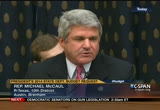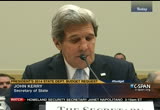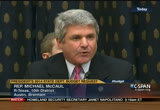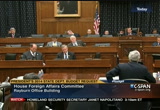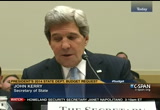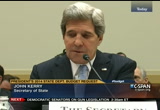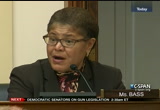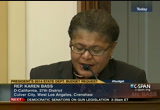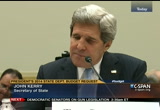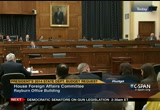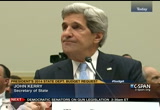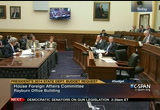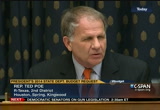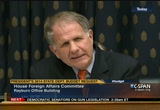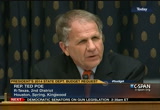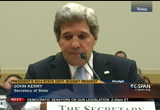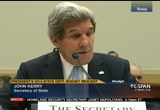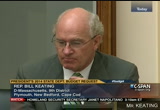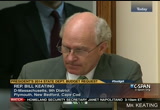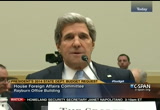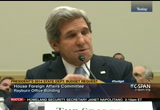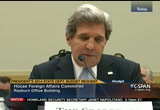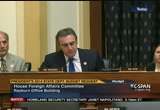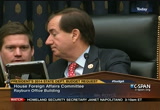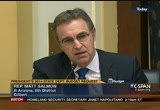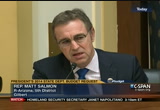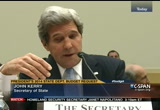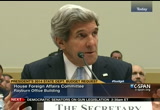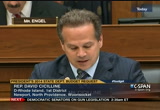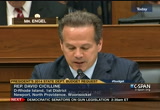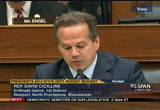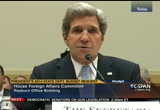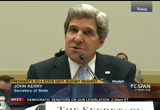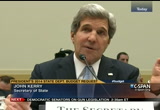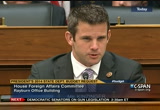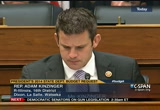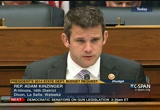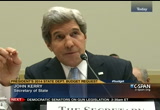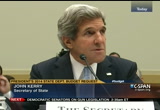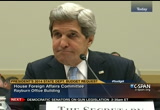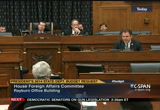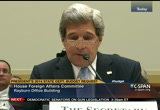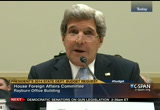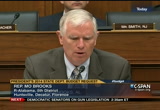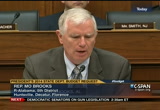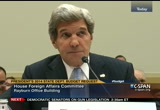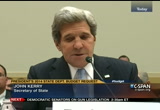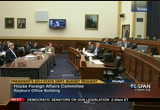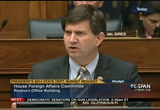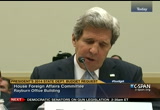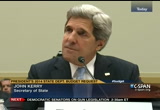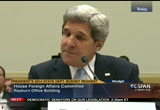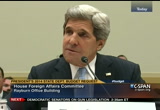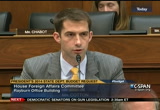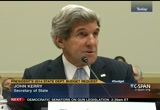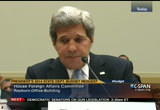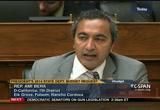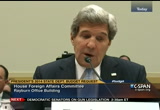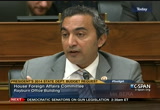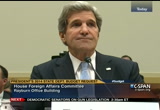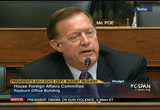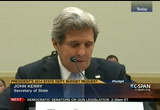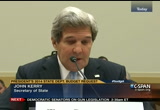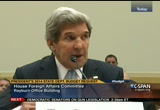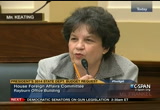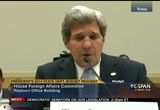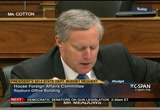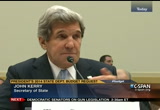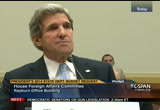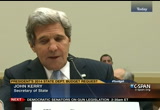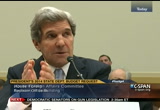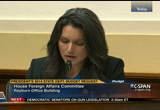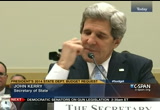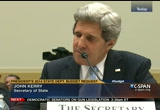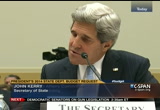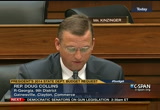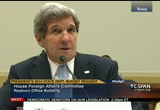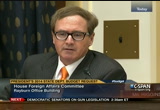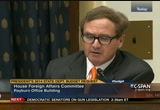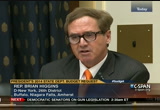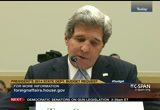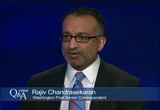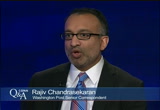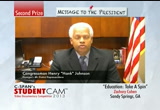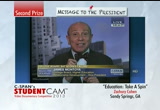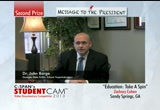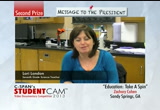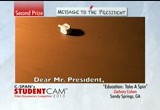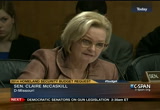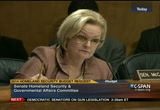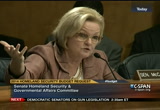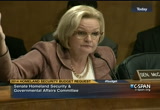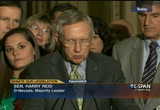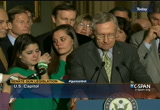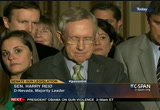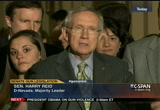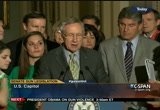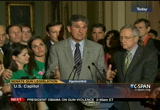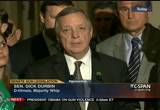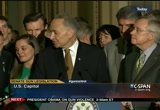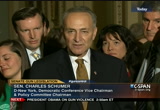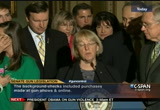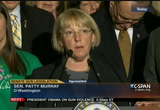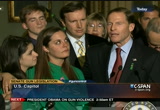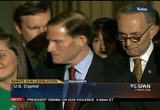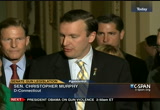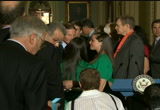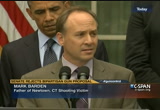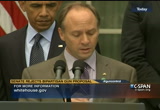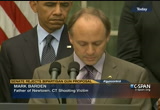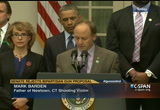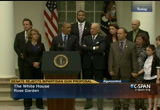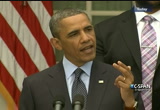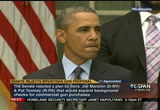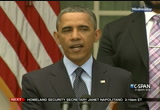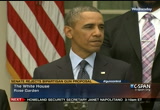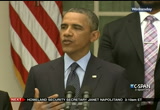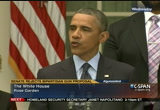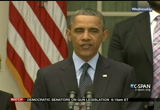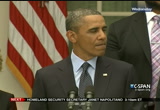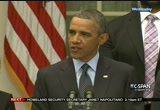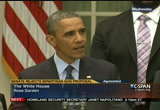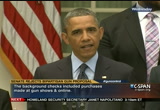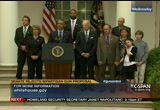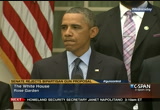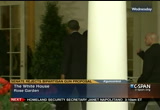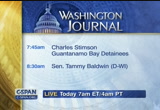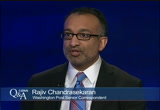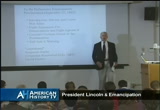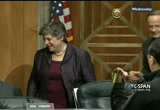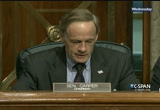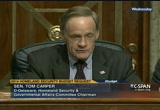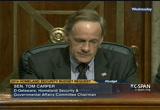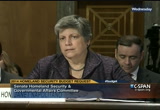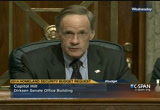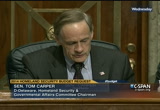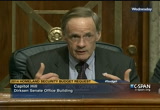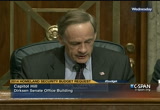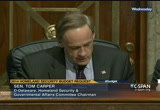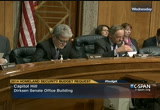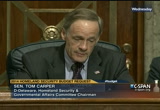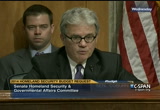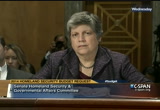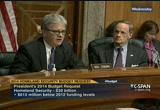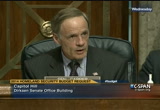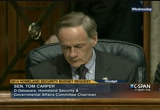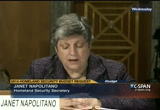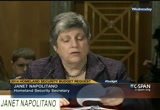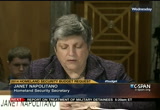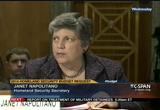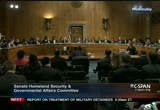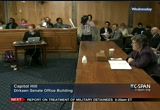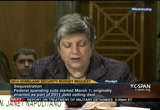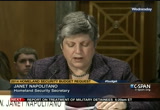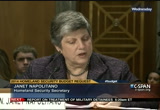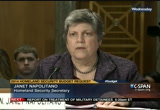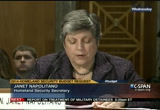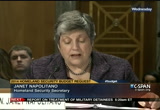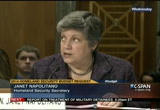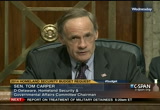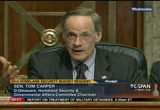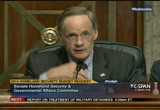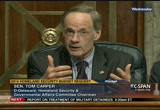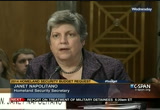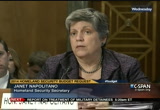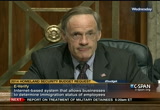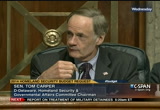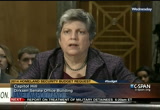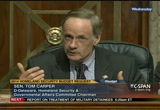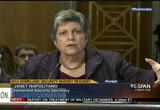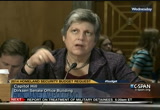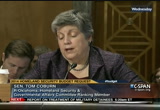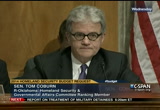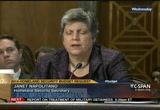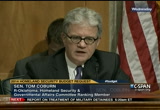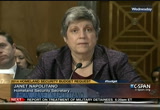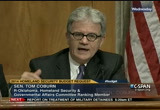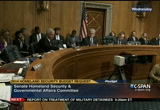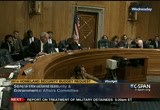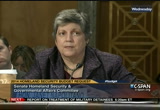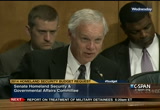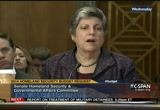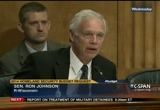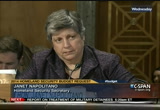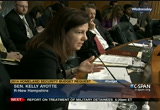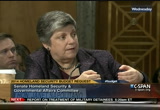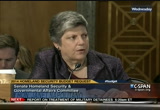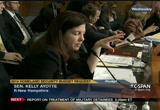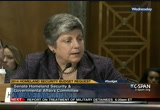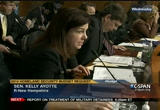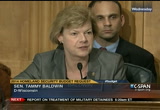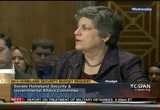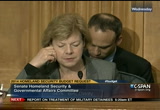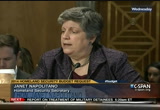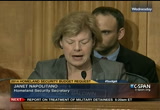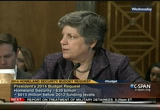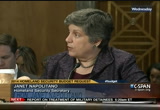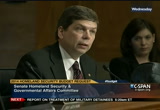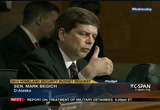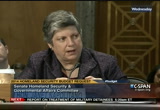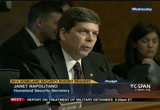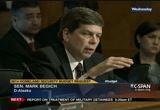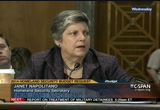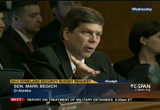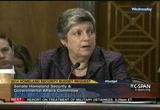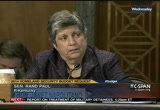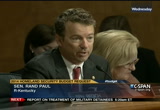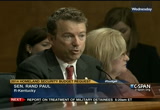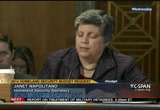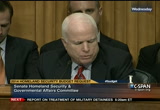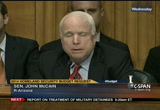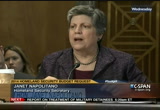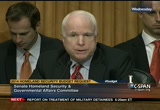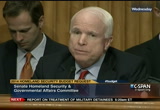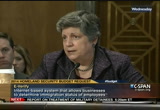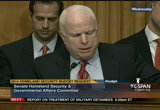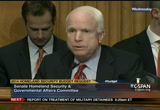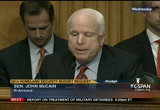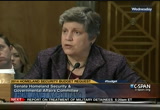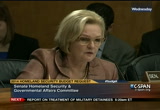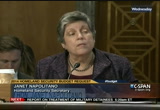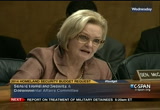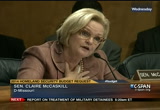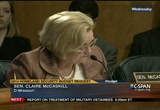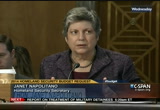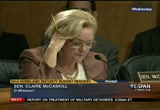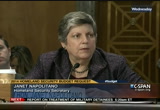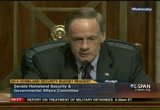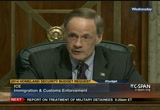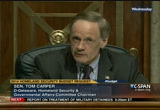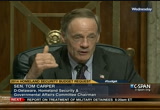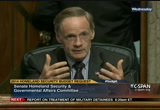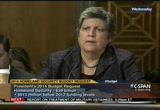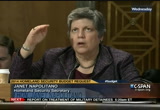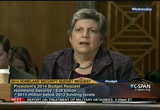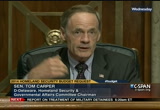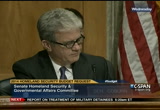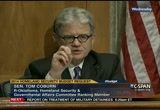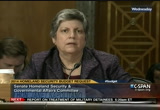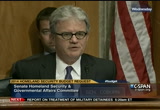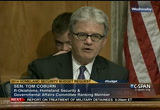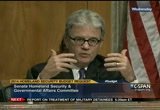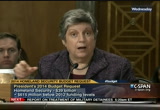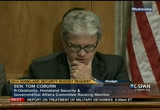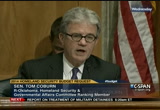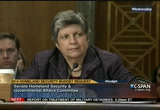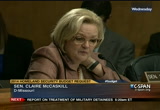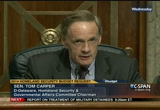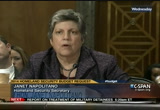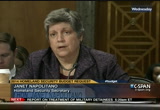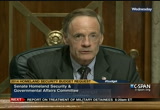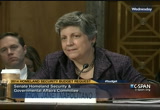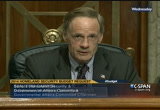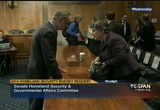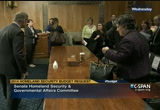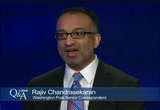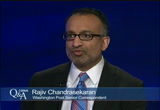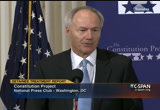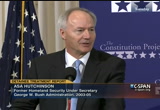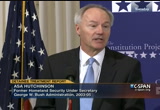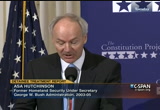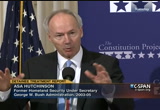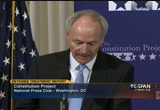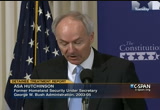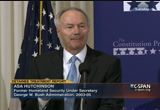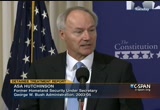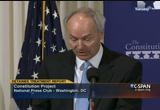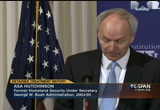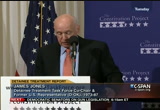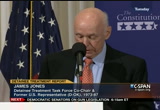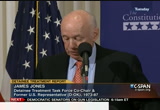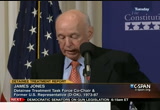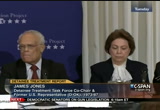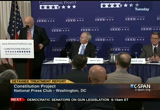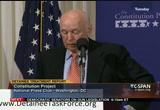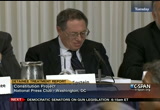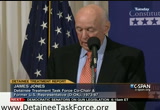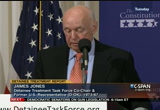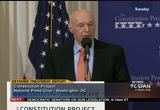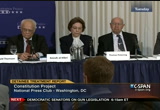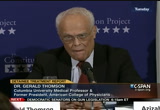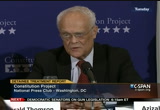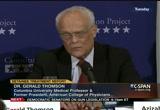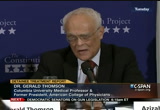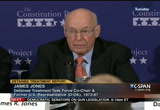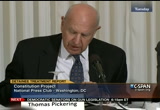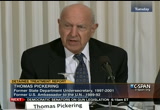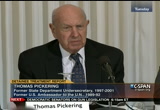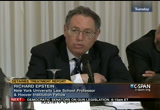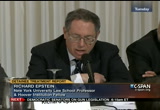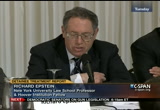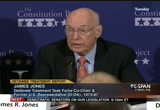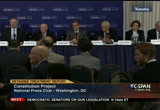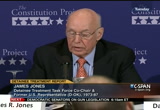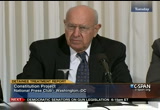tv Capitol Hill Hearings CSPAN April 18, 2013 1:00am-6:00am EDT
1:00 am
were taken in the cry for help from our ambassador to could possibly invented that event from occurring. mr. secretary, can you tell me which individual or individuals saw this table and what specific actions were taken? >> i can't tell you which one reviewed it because there is a process going on right now which is supposed to come to me very shortly which is an internal review and analysis of who did what and who may have or may not have made the right judgment or no judgment or whatever. and i have to act on that. so i have not seen that yet. and i don't want to -- i'm not going to prejudice anything that i have to do here. i think the chairman raised the issue of people still working. there is a process. there is due process. there is an administrative internal process. it will come to me and i will have to make some kind of a decision.
1:01 am
i'm not even sure exactly what the parameters of that are yet because i have waited until it's ripe and comes to me. but i know that it is coming and i'll then know exactly who made what decision or didn't and i'll have some responsibility to act one way or the other regarding it. >> i appreciate that. can i have your assurance you will let this committee know which individuals actually received that cable? >> sure. >> and what response was taken? >> you have a right to know. >> i certainly appreciate that. one last question, this is sort of a mixture of state department and the department of homeland security, but recently the global entry program was offered to saudi arabia. saudi arabia's where 15 of the 19 high jackers came out of. greaterthink of any threat to aviation security than the saudi peninsula with yemen right south of saudi arabia. for the life of me i don't
1:02 am
understand why saudi was given preferential treatment over our nato allies who fought alongside with our soldiers and fought and died and were wounded in iraq and afghanistan. instead of rewarding nato, our nato allies with this global entry, we are rewarding saudi arabia. i personally, i'm not trying to be political here, i think it's a dangerous policy. americanresult in lives being killed. >> i'm just trying to determine, i apologize, i'm trying to determine who actually makes the final decision on that. and i'm told it's an interagency process. which is -- doesn't satisfy me and won't satisfy you. i need to find out where that
1:03 am
final decision gets made. but, i want to say this in fairness, saudi arabia has cooperated with us and is cooperating with us in extraordinary ways. there are plots that we have uncovered that have never come to light and won't and shouldn't because of saudi arabia's assistance. saudi arabia's providing invaluable assistance in the counterterrorism efforts in the arabian peninsula. and saudi arabia has an extremely effective and has entered too with us a major capacity vet, to determine the security. as you know, in the global entry program, you go through a huge background analysis and check. plus, you have major biometrics that are a component of it. i went through this a year ago or so-so i could join it. and i remember every fingerprint, every aspect of you is problemmle to guised so you
1:04 am
wind up with a pretty good sense of who is who. i personally have confidence in the capacity of saudi arabia to do that. i think i wouldn't prejudice them automatically by virtue of what happened. >> i agree. i will say the saudis have been extraordinary allies with respect to intelligence. i agree with you on that point. i do think it merits review by your department as well. >> i'll check out on the final review. i have great confidence in the saudi arabia contribution. the kingdom has been helpful in any number of ways. >> mr. secretary, going back to
1:05 am
your earlier comment as you referenced the benghazi review, can you provide us a copy of that internal review once it's completed? >> i don't know. honestly i don't know whether there is a privacy internal administrative restriction we all have given through congress. i don't know what the law is. >> we will make a request on that. and appreciate your follow-up on it. we go now to karen bass of california. >> thank you, mr. chairman. i want to congratulate secretary kerry on your appointment and also join my colleagues in expressing my condolences. i look forward to working with you and especially working with the committed women and men at the state department. i have to tell you that i have really enjoyed working directly with the state department and i'm honored to have an excellent pearson fellow in my office who i am looking forward to continue to work with me. as the ranking member of the africa subcommittee, i wanted to share with you several priority issues i hope you'll consider.
1:06 am
first of all u.s.-africa trade relations. number two, the importance of development assistance programs, including global hiv-aids funding through pet far. and number three, support for peacekeeping operation. as you know the u.n. is considering establishing a peacekeeping isce in mali, and there already a substantial peacekeeping mission in the d.r.c. i know you are aware six of the 10 fastest growing economies in the world are located in sub- saharan africa, and it is my hope to the extent possible that the state department will prioritize trade with the african nations. you should know that we have a bipartisan, bicameral effort working in conjunction with chairman smith to quickly put forward a renewal of the africa growth and opportunity act. so i have four questions i'd like to ask you. i wanted to know what steps are
1:07 am
you taking to focus on africa's extraordinary growth potential? what are your thoughts about the u.s. appointing a special envoy to the d.r.c.? does the request for peacekeeping operations accurately reflect the growing needs on the continent? and can you comment on the significance of the 6% cuts to usaid hiv-aids funding. >> let me emphasize first of all that we are really pleased that pepfar was able to be held whole. i think that's vital. i have personally visited, i was in durbin, north of durbin in the mountains watching how that program is being effectively administered and the difference it has made. we are looking at, as secretary clinton said when she testified, we have the potential to have an aids free generation as a result of what we have done.
1:08 am
and we should be very, very proud of that. that will continue completely. with respect to the d.r.c., the answer is, yes. we are going to appoint a great lakes special envoy in short order. i think you'll be very pleased with the president's choice. that is also caught up in the vetting process right now. but i'm very anxious to do that because i believe that without a great deal of input, one could deal with m-23 and encourage rwanda to perhaps take a different approach, help president kabila to be able to deliver better governance. there is a lot we can do but we have got to be able to be there and engaged. in that end to answer to your question is the level of funding sufficient? the answer is it's what we can ask is for under the budget constraints we are living with.
1:09 am
but i don't think anybody should kid themselves that we are stepping up to do what is is possible and what is perhaps morally critical with respect to developing an indigenous african capacity to respond through the a.u. or otherwise to some of these crisis. as you know we have a number of u.n. efforts there now. they are just not yet sufficient to be able to do the job. so we have some development work to do. and it would be such a return on investment, because a lot of this violence is thugism. it's just crime cals. who run around and unleashed. if we have the ability to be able to provide some order, i think we could do more for economic development and peace. >> absolutely. mr. secretary, before i finish, i really think that we need to just change our perspective and how we view the continent. with some of the world's fastest growing economies on the continent, i would like for you to address the significance or priority -- >> six of the 10 or 12 fastest
1:10 am
growing countries in the world are in africa. and i want to say to our colleagues here, we all are concerned about our economic future. china is investing more in africa than we are. and we need to -- it doesn't have to be zero sum game, but we ought to recognize where our future economic interests and capacity may lie, and i think that's why these investments are so small against the return on investment in the long run. and africa, we need to be deeply engaged in and intend to be. the president will travel there. we have a lot to do. >> thank you. >> we'll go to judge poe, chairman of the subcommittee on terrorism nonproliferation, and trade. >> thank you, mr. chairman. thank you, mr. secretary. for being here. i want to first of all thank you for your help last year on the foreign aid transparency act. i think we can -- if we get this passed this year, it will
1:11 am
do a americanplain to the public why we give foreign assistance if it's held accountable by some type of legislation. thank you for your work on that. i want to talk about, if i have time, four different issues. north korea, benghazi, the m.e.k., and also pakistan. i read recently that when you were in china that you suggested the united states would reduce our missile defense system in asia for exchange -- in exchange for chinese help with north korea. it seems to me even though we are being threatened by nuclear attack by the north korean government, first of all is that an accurate statement? if so, explain that if you would. >> no. not an accurate statement. i think it was corrected while i was over there. there was reporting to that
1:12 am
effect. what i -- there was no offer, no deal, no contemplation of it. what i did say publicly and i'll say it again, is that the president took specific deployment steps of missile defense in direct response to north korea. and it stands to reason that if the north korean threat disappears, there would be a logical question of whether or not that same level of deployment is necessary. all i stated was a sort of fact based on the rationale of the deployment itself. >> do you think that the united states should give aid to north korea of some type to temper their saber rattling, which they seem to do, about this time every year? >> no. >> all right. thank you for those comments. i'm glad i agree with you totally. i just want to clear that up for the record. also as all have said regarding boston and chairman mccaul especially, the activity of our first responders was textbook, but also the people. how they came out of the stands, down the street to help other wounded and critically wounded citizens. and not citizens at well. people from all over the world.
1:13 am
i especially am encouraged by the cowboy from costa rica that is now an american citizen, how he helped with one of the runners. that's what some of the best part of america is the people. you mentioned bringing those perpetrators to justice and they will be brought to justice, but buttressing in on benghazi, it's been seven months since that attack. people are frustrated. members of congress are even frustrated. they want several hundred want a select committee to study benghazi. of course many of them aren't on any committee of jurisdiction, but they want a committee. i hear comments all the time,
1:14 am
why haven't we captured somebody that did these bad things in benghazi? reports indicate that the libyan government really won't do anything because -- reportedly, some of the groups, the militia groups that support the libyan government may be involved in the attack. would you comment on that if you can? >> i don't have any knowledge whatsoever. let me just say one of the first thing i did when i came in was call director mueller at the f.b.i. to get an update on this. because obviously we -- there no familiar in america -- family in america that wants justice than the state department family, believe me. so i wanted to know where we are. and i think we are making progress. now, there's video as you-all know.
1:15 am
we have identified people. and they are building a case. we are going through the tedious, laborious, and very difficult process of gaining evidence from the part of the country which is dangerous. and working in a place where the standards are different and the expectations are different. we are working through that. but i can guarantee you this. i think all of you know because of bob mueller's service, and peoplera years that passed a law to allow him to serve, there is no more dedicated or capable leader of the f.b.i. and there is nobody more committed to do this. i have confidence in that. i also have confidence in something else. this president of the united states made it clear once before that he would do what was necessary to bring somebody to justice. and i guarantee you he has made it clear yet again that we will find justice here. and the president will do what is necessary. our hope is to work with the
1:16 am
libyan government and do this through a process. >> i'll submit further questions for the record, mr. chairman. >> go to william keating of massachusetts. >> thank you, mr. chairman. thank you, mr. secretary, for being here. i know that both of us, although we are here, part of us are still back home in massachusetts this morning. getting to the theme of this morning's hearing, your theme of small smart investments is right on point. i think that we can approach the broader issues of poverty and the rule of law and education and health care around the world without dealing with these issues. they are core to any advancement in that area. and furthermore i think they are the smartest way to make some of these investments. for our dollar and to be effective. so i'd like you to just do two things, if you could comment
1:17 am
on. one is, generally comment on your ability to deal with these gender equality advancement issues with women around the world, and number two, particularly, gender-based violence, you know it in your capacity, knew it when you were a prosecutor, as i did, they know no borders or bounds when are you dealing with violence based on gender-based violence. internationally the violence that so many women experience take many different forms. from rape to early forced marriage to traditional practices that occur. such as genital mutilation, honor killings, acid violence, sexual violence. i could go on and on and on. could you comment on the department's first time ever strategy to prevent and respond to gerned-based violence globally? those are the two things i'd like you to comment on.
1:18 am
>> thank you, congressman. good to see you. thanks for our shared feelings about what's happened up in boston. secretary clinton did a terrific job of putting this issue squarely on everybody's agenda, and i'm determined to make certain that we live up to that standard if not exceed it. and i think we are in a good start to do that in terms of trafficking issues and other things, but in london last week at the g-8 ministers meeting, foreign minister hague of great britain made the centerpiece of our meeting sexual violence as an instrument of war.
1:19 am
and we have -- had a meeting, we had outside is representatives come in who helped to raise the profile of that. and in my judgment it was a very valuable moment for people to realize this is going to be held accountable as a war crime. and that we are going to keep this gender-based violence front and certainty as we go forward. i would also say to everybody, when i was in afghanistan a couple weeks ago, when ann submitting who have was my control officer, she helped put together a remarkable meeting of 10 entrepreneurs, 10 women in afghanistan who are struggling against all of the resistance, culturally and historically, in that country to stand up and start businesses and help girls go to school, help women be able to be entrepreneurs.
1:20 am
a remarkable process. and the courage that they exhibited deserves everybody's support. it will certainly get ours in the state department. we are going to continue this in many, many different ways over the course of the next year. i think you'll see us continue it. >> thank you. in terms of accountability, mr. secretary, could that also include some conditions that might be tied to aid from time to time? to some extent. >> congressman, there are someplaces that i think lend themselves to that kind of condition at, and there are others that just don't. i don't think there's a blanket cover all way of explaining a set of standards that's going to apply everywhere. in some countries the standards actually could be counterproductive and you don't get done what you're trying to do. it depends on what is the package, what's the nature of the program, and i think you have to be pretty customized in that approach.
1:21 am
>> thank you. mr. chairman, as i turn it back to you, i do want to thank the members of the committee as well. as the members i have been talking to on the floor for their genuine and heartfelt concern about what's occurring in boston. i know we are all in this together. i want to thank the secretary for his remarks. >> thank you very much, congressman. >> thank you, mr. keating. we go now to matt salmon, chairman of the western hemisphere subcommittee. >> thank you, mr. chairman. mr. secretary, welcome. first of all i'd like to submit several written questions that were put together by 700 retired special forces operators that are in regard to benghazi. and i just like a written response on that. also, you've urged us to review the video from the attack of that night. we have requested that video but
1:22 am
the department has not provided it. >> we don't have it. i saw it in a classified briefing. i believe it may be the agency or something. >> would it be possible for you to take measures to ensure we do get it? a i'll try to find out where it is and what the deal s i'm surprised. >> we have requested that video, but it's not been provided. >> we had an all members briefing, i'm reminded, in the senate, it was shown there. >> in the house there was? >> there was an awe members briefing in the house, apparently, which did show it. >> if we could get that as a committee it would be extremely helpful. >> mr. chairman, do you know which committee would have hosted that? all members? maybe the leadership did. every member who was there saw it. if you haven't seen it i'm sure people will make arrangements. >> i have a few questions regarding the western hemisphere and energy issues. as the chairman mentioned, i am eat chairman of the western hemisphere committee.
1:23 am
and i'm very interested in what the next move is going to be from the administration regarding the xl pipeline. coumentedit's been over and over and over again the jobs that that will produce. the benefit to our economy. your state department has said that there is no significant greenhouse gas issues with it or problems with regard to global warming. and so i'm kind of wondering why the administration continues to stall on that. also regarding liquid natural gas, we have an over abundance of l.n.g. in this country, and a great opportunity to export, especially to the caribbean. economiccurrent problems in venezuela and i think their diminished capacity to provide this great commodity, we
1:24 am
have a phenomenal opportunity, again, to provide jobs in the united states and export the president said he wants to double our exports over the next five years. i wholeheartedly endorse that idea. it's wonderful. here's an opportunity to actually put our money where our mouth is. i'm wondering what it's going to take to get the department of energy to get off the dime on issuing these permits so that we can get on with exporting that, especially to the caribbean. and finally, i am a strong supporter of the transcontinental hydrocarbon agreement with mexico. it can provide another wonderful opportunity for the united states and america to enter in a great economic joint venture, as well as make the western hemisphere energy independent, which i think is a great goal. we have some great opportunities, i think, to do economic activities with our partners here in the western hemisphere, but i think it's time for us to move forward with that.
1:25 am
i have met with some of your personnel and they have submitted language that's acceptable. i'd like all hands on deck from your department to help get that done now. thank you. mr.hank you very much, chairman. i -- let me begin by saying first of all there is no, i assure you, there is no stalling going on. the law is being followed. wire just following the law. we have a procedure that has to do the e.i.s., it was appropriately contracted out, e.i.s. was done, then we have a public reporting period. that public reporting period is going on right now. then after the public reporting period there is an option. it's all under the law.
1:26 am
to perhaps get more information if there is some reason the public comment required it, there is a determination the public interest, and ultimately the decision will come to me. it's not ripe. it's not there. and i am staying as far away from that as i can now so that when the appropriate time comes to me, i'm not getting information from any place i shouldn't be and i'm not getting engaged in the debate at a time that i shouldn't be. we are following the legal procedure that is required. i assure you. secondly, regarding l.n.g. and so forth. look, i spent a lot of time on energy and climate and so forth when i was in the senate, and i would love to see the western hemisphere be energy independent. it's not a dream. it's conceivable it could happen. you and i might have a slightly different sense of what the mix of energy ought to be, and how you might achieve it, but it's doable. and i think it's worth us trying to proceed it. i think there is a canada-u.s.- mexico slash latin america central america component to this which is worth exploring. i'm prepared to do that.
1:27 am
ofwe go now to mr. cicilline rhode island for five minutes. afterwards we'll go to three minutes per member. >> thank you, mr. chairman. welcome, mr. secretary, thank you for your continuing service to our nation. i, too, want to extend my condolences to you for the recent loss at the state department. i know i speak for all rhode islanders when i extend our condolences for the residents of the city of boston and massachusetts. and express that they will continue to remain in our thoughts and prayers. i'd like to also add my voice to the priorities set forth by my colleague, congresswoman bass about the continent of africa and being engaged in that region of the world. pleased to hear that response. with your indulgence i'll submit written questions with respect to the status of the implementation of the
1:28 am
recommendations of the accountability review board as they relate to diplomatic security. question regarding the waiver program for portugal, and the air force base in the azores and mitt gating the impact there. and question regarding armenia. question about our long-standing relationship with greece. and finally the state department's role in protecting lgbt individuals, human rights of those individuals around the world. today,e to ask you is mr. secretary, to speak to two specific areas. syria and north korea. as you know, mr. secretary, over a million refugees are currently left syria. at the kuwait conference in january pledges were made of $1.5 billion in humanitarian assistance, but only a small percentage of countries have made that pledge have fulfilled their pledges. i'd like to you speak to what efforts are under way to ensure that kuwait, saudi arabia, and the u.a.e. in particular are making good on their commitments and what coordination is under
1:29 am
way with donor countries to ensure that the assistance is reaching the affected individuals? i'd also like your thoughts on whether or not we are considering closing the syrian embassy here in the united states and what the rationale of keeping that relationship ongoing. and finally, on the issue of syria, i'd like to speak about what efforts are being made with respect to protecting syrian girls and women and the refugee cams. we have seen some recent reports, again, that talk about sexual violence. the exchange of money for family members in exchange for young women being forced to marry. so the sexual violence in these refugee camps is a particularly important issue. secondly, i ask you to talk a little bit about what your recent trip to seoul and tokyo might have contributed to your thinking about what's happening on the korean peninsula.
1:30 am
what's your assessment of what could happen, what we might be able to do as members of congress to help bring stability to tot region of the world and protect american national security interests on the korean peninsula. >> thank you, congressman. good to see you again. i appreciate the questions. on syria let me say quickly we are really in touch very directly with these donor countries. as i said, we have given $385 million to the refugee issue. we are nearing the million mark over the fourth largest city in jordan today is a tent city, a refugee camp. you can imagine the destabilizing impact and the problems with the jordanians who have other issues and challenges economically.
1:31 am
this is a big deal. in lebanon you don't have camps. in lebanon the refugees are spread throughout the country, but the estimates are they may be as much as 10% to 20% add on in terms of population, and then in turkey you have very significant numbers of refugees in addition. you also have displaced persons within syria itself. so this is reaching a major humanitarian crisis level, and it's one of the reasons why we are going to meet in istanbul this weekend is some of the donor countries will be there, but none of us want to sit around and simply see this refugee crisis grow and grow and ultimately wind up with an implosion of the
1:32 am
country itself. that may happen. i'm not going to sit here and tell you that we can prevent that. but the best shot at preventing it is to try to get to the negotiating table to get the geneva communique implemented so that you can save the institutions of the state, not wind up with an enclave estate with huge instability and problems with extremist groups that have grown stronger as a result of this conflict. so time is our enemy. sooner is better in terms of getting to the tabling and conceivably getting some agreement. just very quickly because i know the gavel's rung, on north korea and the peninsula, repeat again, president park has a new policy called trust politic. and she wants to reach out to the north. she obviously can't do that in the middle of this kind of process. my hope would be that the chinese will come to the table in way they never have before. that we can work with the chinese to redefine what's in all of our interests. which is a kind of stability in the peninsula, moving north to denuclearization, and ultimately hopefully an integration into the community of nations based on economic reform which china, the united states, others could become engaged in.
1:33 am
that could ultimately even open up the possibility of president park's outreach to be able to have an impact. absent china coming to that table, i believe kim jong il cal clates that i could get away -- calculates that coy get away with anything if china doesn't hold me accountable. that's where we are. >> mr. adam kinzinger of illinois. >> thank you for being here, mr. secretary. since my time's been cut down i wanted to make a few brief comments and a couple of very brief questions. first off i want to say i was one of six republicans to support the president in libya. i supported the decision to go in there. i think it was the right thing to do. i believe you had mentioned in your testimony and the strength of america and that america cannot retreat from the world even toughes when we face
1:34 am
budgets and everything else. and i'm glad to hear you say that. where i was dismayed in the libya situation, though, and what i have seen since then, is this idea of america leading from behind. and it's a strategy that i know was mentioned a couple times in passing, but i worry that we are now trying to, as a nation, be more of a leader from behind. i believe personally that when america retreats from the world, or retreats from the leadership role in the world, that chaos ensues. so it's an area -- i want you to address that but i want to make a couple of other quick comments. you mentioned i think in one of your -- senate confirmation hearing that you hear from diplomats they wonder if the united states can continue to deliver. and i appreciate that. i wonder if that is related to the new strategy of leading from behind and not necessarily a financial issue. i believe one of the greatest mistakes we have made in the last few years was not leaving a leave behind force in iraq. i believe now what we are going --
1:35 am
>> you can continue to watch a concern i have is the funding for education. 95% of soldiers are reported as a leverage. -- deliberate. position with the timetable, are we in a position without a strong u.s. military presence to leave behind an afghan military that can defendant self against the taliban? i will give you the remaining minutes. >> let me began. i am happy to have this opportunity.
1:36 am
let me kill this idea of leading know whatd i do not this means. i do not know how you lead from behind. >> it confused me. led believe this president in libya. the fact you decide not to put your boots on the ground does not mean that you are not leading. they're different roles for different people to play. almost every member of this committee what is said, i do not want boots on the ground in libya. notoes not mean we are leading. e e president sent me to rom bring together a core group emea upped we were doing -- and we upped we were doing. i went to turkey and i met with the prime minister and we agreed that the president's
1:37 am
instructions to see if we could put together an additional effort with respect to syria. that meeting will take place this saturday. i believe the president has led from the beginning in helping to but the syrian opposition on the map to get recognized and have the paris meeting, the london meeting. that is leadership. the whole purpose of our policy today is to train and equip the afghan army to be able to fend for itself. most of the reports, colleagues who have been traveling there, friends from the senate, were encouraged by what they have seen the afghan army capable of doing. he did not see major assaults by the tall a ban against the army. he see people blowing themselves -- taliban against
1:38 am
the army. you see people blowing themselves up. that what weact is are seeing is desperation on the part of the taliban and hopefully, in this fighting season, we will see what their value in the capacity of the afghan army is. we have two fighting seasons, to see how this army develops. as to the leading of the troops in iraq, the iraqis would not give our troops immunity. >> if the members can be brief with their questions, we can get through all of the members. ask you a few questions about the visa waiver program. are you familiar with the program? >> in general. that is a good way to describe
1:39 am
it. >> the administration had the authority to add countries to the waiver program. and now it does not. would you like to see that authority restored? the authority to add countries to the visa waiver program which allows qualifying citizens to come to the united states. >> we have a standard, as you know, that people are supposed to meet in order to be able to qualify. you will not have every country isa he world being vos flavored -- waivered. strongd you like to see strategic allies like israel and brazil and poland rewarded for their cooperation with u.s. foreign policy by including them in the program? >> yes, but i am not in favor of
1:40 am
waiting standards to do it. been whatndard has you described, which is a 3% rejection rate. some countries go slightly beyond that because there is not the uniform standard applied by embassies throughout the world. some embassies have more liberal policy with regard to applications. instead of outsourcing decision making, would you like to see in touch with regards to diplomatic and security and economic considerations? >> i would have to review that. there are several established criteria and the act with respect to the current standards. the government provides a reciprocal visa waivers. the government issues secure machine readable passports. the government certifies the
1:41 am
program to incorporate biometric identification into their passports. the government reports the thefts of blank passports. that they maintained a low immigrant refusal rate. that they maintain less than 2% projection for travel for non- immigrant applicants. those are the standards and the current law. you guys have the right to change that. that is the current standard. i am not in favor of waiving that. >> none of those standards are economic. >> will you give us a lot more analysts in the budget? >> would you be in favor of considering those factors? >> i want to have some evaluation to make a judgment. >> thank you. >> mr. brooks and alabama. >> seven months ago, americans
1:42 am
were murdered at the benghazi consulate. you mentioned that the ministration has testified eight times, given 20 briefings and provided 25,000 pages of documents about benghazi. the american people still do not know why ambassador suan rice made so many false statements to the american people about what happened in benghazi. 2012,tember 16, ambassador rice stated "what this began as, it was a spontaneous, not a premeditated response to what happened in cairo. npr,n president stated on the idea that this criminal and cowardly act was a spontaneous protest that spun out of control is completely unfounded and preposterous.
1:43 am
we believe this was a preplanned attack that was carried out to attack the u.s. consulate. the state department's own accountability review board concluded that there were no protests prior to the attack on the u.s. consulate. on september 16, 2012, on meet the press, the ambassador said, what happened in benghazi was initially a spontaneous reaction to what had transpired hours before in cairo, almost a copycat of the demonstrations against our facility in cairo. ambassador rice made three false statements. she misrepresented the benghazi was a spontaneous reaction to the cairo protest. ambassador misrepresented that benghazi was a copycat.
1:44 am
she said benghazi was prompted by an anti-muslim video when there was little credible evidence to support this claim. we now know, the libyan president told the truth. the ambassador to the united nations did not. my question to you, can you give us -- give assurances to the american people that you will conduct an investigation that will find out why the ambassador made so many false statements to america about what happened in benghazi and that he will share your findings to the american people? >> no. i do not think it is necessary. ambassador rice has apologized for her mistaken comments which were based on talking points she was given. she was mistaken. beyondsolutely confident any reasonable doubt the ambassador did not mislead
1:45 am
anybody. she was using the talking points and there was confusion in the early hours about the demonstration that took place in cairo and the release that had taken place from an embassy personnel in cairo. which was inappropriate. it was not a jury well thought out. it said something about -- i cannot remember the language. bill looked as if we were not standing up for freedom of speech. aat wasn't -- there was sufficient level of confusion. i think she would tell you she over relied on as talking points. i can tell you that susan rice and never go out and purposely misleading. at some point, we have to find a way to make a judgment here about how much information we have and how much information is someone out there that might
1:46 am
contribute something further constructively. i will work with you. i do not want to spend the next year coming up here talking about benghazi. if there is something legitimate that really needs to be put on the table, i will put it on the table. i will work with you in good faith. i believe you will not have questions. i ask you to put what your members feel they need, but let's put this behind us. we have serious, major current important vital to our national security issues to be debating. i will help you cleared the air on this, but i want to do it in a fair minded way. >> we will not go to mr. schneider of illinois. >> -- now go to mr. schneider of illinois. let me start by expressing my
1:47 am
condolences to the families lost in boston. my wishes for a full recovery to those injured. i want to extend condolences to anne's family. i think it is important to note that cowardice act of terrorism in boston. all those -- let me thank you you for this budget to making sure our people are around the world in harm's way have the security they deserve. let me turn my questions to israel and the palestinians. you talked about the window closing on a two-state solution. indicated on both sides for seriousness of purpose.
1:48 am
in the context, we look around the region, the threats of nuclear iran. was not that abbas convinced that there was a pathway to peace. is the partneren for peace, i have questions about it. of thewe in light resignation and the directions -- how do we get them to the table for negotiations of the window does not close and we can find a pathway to peace? >> i am happy to clarify because it is important. i have enormous respect. i have worked with them closely at many meetings.
1:49 am
a lot of people had confidence in his stewardship, the accountability, transparency brought. he is not going away. he will be there as a caretaker, i do not long -- no longer -- i do not know how long it will take. he will remain involved in palestinian affairs. process and the capacities of the palestinians are bigger than one person. there are people who can continue this journey. i am confident of that. i believe there is a way for the president to be persuaded of the good-faith efforts that the israelis are prepared to take, providing they take them, and there is a way to get to these negotiations. i am not saying there is no path
1:50 am
away, he comes to the table with enormous mistrust, as did the israelis. they pulled out of gaza and continue to get rockets. people that have led the non. we all know the history. .- they pulled out of lebanon we all know the history. is a way to avoid the unachievable preconditions. i believe there is a way to build a series of initiatives that can speak to this mistrust. you have to do it quietly and you have to do it patiently. you also have to do it rapidly because of this timeframe. the president has the power to go to the united nations again. he has the power to ask to be a part of an agency or recognize,
1:51 am
which was a vote of 120 something-9. finduld be difficult to those nine next time. and people know that. he may find four or five, but you will not find the nine. he is restrained from doing that. that is a sign of good faith. he would like to see if we could get this process moving. theybody needs to not react stereotypical way. give peace a chance by providing some opening here for the politics and diplomacy to work. that is what both sides need to do. that is what i believe both sides are prepared to do. the proof will be in the pudding. mr. secretary, thank you for
1:52 am
your time today. thank you for your service to our country. nations recently approved the arms trade treaty, article 5 requires nations to create a national control system which includes a national control list. article 10 requires nations to regulate the brokering. i am concerned that in the unlikely event the treaty is approved by the senate, it could be used to justify such measures as a national gun registry, a ban on certain type of ammunition, or licenses to purchase firearms or ammunition. can you assure the committee that the administration does not intend to pursue such measures? >> i can absolutely guarantee that this administration is not going to do anything to violate the second amendment rights of any citizen of the united
1:53 am
states. whatever we agreed to will be constitutional and appropriate. >> that includes in the interim period, there is a customary international norman. -- norm. the demonstration will not do something to enact those measures through executive order. >> the president has made it clear. watching the debate on guns right now, it seems to me the president's position is pretty clear. he is not proposing -- as controversial as some of the issues may be, there is nothing there that would suggest a fundamental violation of second amendment rights. people can still disagree with one position on another. >> i want to move to syria and arming the syrian rebels. the united states should consider providing lethal
1:54 am
military assistance to the rubble so they can be more unified. morerebel so they can be unified. we know that secretary clinton and secretary panetta and general petraeus all supported. the president and his advisers blocked them. i am wondering what your current position is on whether the united states should engage in providing that kind of assistance. our middle eastern allies should consider that. where does the united states currently stand on it? >> the policy is that we are not providing aid. we are coordinating closely with those who are and with our core group allies. thiseeting we will have week in a sample is to evaluate -- in istanbul is to evaluate the position on the ground.
1:55 am
we'll have that meeting. the final comment on with respect to -- i will leave it there. i think that covers it. you forecretary, thank appearing here. i wanted thank you for your service to our country. i look forward to working with you. as my colleagues have already expressed, our condolences go out to the families and victims in boston. what it does point out is we have to remain vigilant against those who are jealous of our freedoms and our way of life. we have to remain vigilant against terror, whether domestic or foreign. i want to complement the chairman for convening a series of here is -- hearings on south asia. at one of those hearings, we had
1:56 am
the pleasure of questioning undersecretary blake and talking about the importance of holding onto our gains in afghanistan and continuing to maintain stability. the importance of india and this role. i know there has been negotiations between the united states, india, and afghanistan to stabilize the region. a recognition of india's critical role. you an like to hear from update on how those negotiations are going and your thoughts as we are drawn down on how we maintain the gains and the safety and do not let terror reemerge in afghanistan. >> the negotiations on the bilateral security? they are proceeding. i think they are going effectively. i had a very good meeting with president karzei a few weeks ago. i think he is well disposed to
1:57 am
morning to finalize the agreement. i think it is in everybody's interest to do so. jury is out on the question howhere -- of exactly independent this army we of helped build is going to be. it is performing pretty effectively right now. the early indications seem to be that the morale is high, the enthusiasm is up. green on blue incidents have knockdown, not on weds -- n on wood. this is the fighting season. >> i am curious about your perspective on india's role in helping -- >> india can play a huge role. i have been a longtime believer in india's capacity to be an important partner.
1:58 am
tradell taking the first mission to india in the 1990's when they began their economic transformation. a far cry from are the art today. i've boys believed because of their democracy, -- i have always believed because of their democracy, tradition, there are great reasons for us to partner with india. india and pakistan have a very different relationship. it is a very complicated circle between afghanistan, pakistan, india. they each have a capacity to see bad things happening depending on what the other does. we have to work it that diligently. >> we will go to mr. weber of texas. good to see you. the art is to not be
1:59 am
trapped in the past. that is what you said regarding benghazi. fourpredecessor said those employees that did not pay attention to the request for help, firing them was not an option. i want to know if you have a policy goal and four to define what a fireball defense -- offenses. -- a fire rubble offense -- firable offense. have people but are trapped in a camp called camp liberty that it had a lot of protections removed. you may have addressed this earlier. to keep them from getting trapped in the past, can you tell us that he will move forward in getting the moved out of that camp? congressman, thank you for
2:00 am
those questions. the issue ofto benghazi what is the standard? is the standard. learned there are a set of rules that govern that. know, we operate under standards by which people have expectations that those standards will be adhered to, in terms of hiring discipline and so forth. i am waiting for this report to come to me, which will give me a full indication of what my options are, under the law. let me make it clear to everybody here, the first conversation i had when i became secretary of state and entered into our first meetings was, where are we on the
2:01 am
administrative review board proposals and requirements? weekly, but more so, if necessary, updating. i am asking, where are we? week, believe me, up and down the chain of command, everybody understands the vigilance necessary going forward and the accountability that will be present going forward. it is a good question. we are clearly under the gun on that. every incident will be subject to a new standard. i know that being if secretary. your third question is about being trapped in the past with respect to camp liberty. to bemp has been judged not safe. camp liberty has also proven to have its problems with respect
2:02 am
to security. i understand that. that is why i raised the issue when i was there. i am not saying to you today that i am satisfied yet. i am worried about the security situation there. as such, we have been trying to of theur level initiative to move people. we have contacted countless countries. we have been refused by countless countries. we have worked out an arrangement with the audience -- the albanians, but then people in the camp itself declined to go. we have had an interview process because we are trying to interview people to figure out where the best fit may be to go for them. they have suspended taking part in the interviews because they want to go back to the camp where they were. we are trapped in a round robin
2:03 am
of different perceptions of what people's interests are here. i guarantee you it is a high priority. >> thank you. we will go now to florida. >> thank you. thank you for being with us today. i have three quick questions and i will try to be quick. thecently met folks from u.s. institute of peace. they explain to me they go too dangerous areas of the world, with their insistence of peace, and they are able to reach out to folks who might be more hostile to agencies closely related to the united states. i am wondering whether you work with the state department and whether the state department worked with the institute? >> absolutely. we work closely with them and i admire their work enormously. they do an amazing amount of
2:04 am
work on conflict mediation and termination. it is excellent work. >> thank you. more questions, secretary clinton was here to testify about what happened in benghazi. one of her recommendations was that we allow the state department, when contracting for security in high-threat regions, to use a best value contacting, rather than the lowest bid. usill was filed that many of joined on to accomplish that. i am wondering whether you support that. >> i do. thank you for raising that. i just ran into this the other day in one of the stops i made in asia. the ambassador was telling me they have to hire security at the lowest price. folks. let's get serious.
2:05 am
i absolutely support that. we have got to have the ability to make value judgments in the provision of security and our personnel. thank you for asking. >> i wanted to thank you for continuing the work of secretary clinton in advancing the status of women around world. as you come back, we will have more questions on that. thank you very much. i yield my time. >> we thank you. we go to mark. >> thank you. >> you are patient. >> freshmen have their privileges. as we go to that, i want to shift a little bit to the budget as we start to enter into the spirit fiscal year 2014 looks at $1.8 billion in global food aid to be administered by the u.s. aid. one of the concerns i had is the shifting the resources away from
2:06 am
the requirements that food, being u.s. grown and more flexible, do you not see this as having a negative implication on american farmers? >> not hold the lead. i honestly do not i got to know american farmers pretty well in 2004 and 2003. from adoes buying food foreign source -- >> the market right now, with respect to -- this is not what our farmers are depending on right now. they are exporting at a greater level than any time in recent memory. the market is only going to pick up. there are billions of people to feed. capacity within this program will not make a difference. does make a difference to our expenditures to be able to provide more people food faster when our goal is to deal with malnutrition.
2:07 am
that is the difference between living and dying. >> let me move on. one of the areas we have had a plethora of expert witnesses here talking about military versus economic versus political reform in egypt. it gets highlighted over and over about f-16s being given to egypt were sold to egypt. told it not be more prudent look at shifting some of those funds to be more balanced on the economic or political, or do you feel like it is necessary to continue to ship f-16s to egypt? >> i will tell you, and this will be counterintuitive to a lot of people, but one of the best investments we made over in egypt in the last 30 years is the egyptian military and our relationship. >> we have a government that has changed now. >> we have a government that has
2:08 am
not yet completely changed. i will tell you how and why i'm saying what i'm saying. not fore egypt, were it the restraint shown by the military, were it not for the leadership of the staff, who knows what would have happened. egypt would have been an unbelievable but show -- bloodshed and civil war. but the military, largely through the ethic that had been created working and training in america and various places, there were officer to officer relationships and majors who could talk to each other and colonels who could call on the phone and say, you guys have to be restrained here. here is how you handle this. with the fields marshal during the time the military was managing the country. the fact is, they held to what they said they would do. they held an election. they created a democracy.
2:09 am
the people who won are surprised by the folks. it did not surprise others given the base of the country. they had a democracy. they had an election. it turned over their power and went back to the barracks. they have been an important ingredient to the people of israel. right now, the gauze the piece is holding because of the relationship and the intel to intel relationship. we do not want to lose that. i would love a rigid of love to make an economic effort larger, but as the chairman knows, we work with the chairman, and others, to try to have some component of economic assistance. unless there is economic reform in egypt, unless they can meet the imf standards, unless they reach out to the opposition, unless they create stability and a capacity to invite capital
2:10 am
back from other countries, with the sense of security created, unless those things happen, right now, giving more money would actually be not too good avail. >> thank you. >> we go to tulsa of hawaii. presenceyou for your s.day and your candid answer i want to extend my appreciation and the appreciation of families for your recognizing the necessity of your focus, especially facing very real threat to four votes in hawaii, guam, and other places. doing you talked about things differently going forward. that was a two-part question what other real
2:11 am
incentives can we provide that go beyond food aid? can we get to a position where we can negotiate and have conversations with north korea? on the sanctions front, i think the chairman mentioned earlier in his testimony about the 2005 sanctions on hard currency. we have heard from various experts that worked while it was in place, but perhaps prematurely stopped. we wanted to get your thoughts on why that was and what you're feeling is on those types of sanctions going forward. >> which types of sanctions? >> on hard currency. >> well, with north korea, we do not have a lot of options. as i described in the course of thehearing this morning,
2:12 am
north koreans, for the moment, see their nuclear program as the centerpiece of the regime's capacity to hold itself together. we willas that is true, not be able to do very much until they shift into a denuclearization posture. one of the considerations that is essential to anything to do what theirkorea, perceptions are about their relationship with us, and what china will or will not do with respect to its relationship to them. the north koreans, it appears, are told, that they believe we are prepared to go to work with them. there is a certain mythology but
2:13 am
also a hard core belief to that. that drives their policy. that,her need to shift and until we get to denuclearization, we will not go down the road of providing aid to them of any kind. through too many divorces. i think we need to find that we -- aetting a very verifiable, clear track to denuclearization, at which point, you could venture to do something. i think the biggest thing we ought to try for with china is a paradigm shift where they really decide they are going to try to be like china in terms of their economy and shift into a different economic model, at which point, all of these issues become moot. i do not see much changing until we get that bigger shift. >> we have gone over the time.
2:14 am
we will go to one last question for doug of georgia, followed by one last question from brian of new york. >> thank you. thank you for being here. one of the things i thought was interesting, i was going between committee meetings. you said you are not into politics anymore. i think you were getting back into it today. it is good to hear your answers. when secretary clinton was here in january, she strongly endorsed remedying, getting back to regular order. we practice -- we pass appropriations bills, as we should carry it has been over a decade since that happened. the house did pass an authorization with congress, and included total funding levels -- as well as the helpful security
2:15 am
authority, by local guards. has been consistent. the question i have for you is, do you agree with secretary clinton of the importance of having these appropriations bills passed? is that a priority for you? >> it was not in the senate. >> it's not that it was not a party. we could not get it done. >> that is what we have to get back to. a lot of people want us to function. >> can i comment to all of you, in your leadership roles, i will tell you we are diminished in our leverage in other parts of the world, when we go out there and say, you guys have to get your budget together. you have got to meet the standards, you have got to do this or that. you can tell from the look that they are asking, how is your budget deal going? i have argued this before and i gave a speech in which i talked about getting our domestic
2:16 am
effort together so that we can really speak with clean hands. we need to do that. >> if i could respond, mr. chairman. we are working in tandem on an authorization bill. we will have that passed over the senate. we are talking to our senate can -- parts -- can -- counterparts. any assistance would be welcome. >> thank you. i congratulate you pure that is great. >> we will go to mr. higgins for his question. >> thank you. working with the state department regarding the assassination of the united states diplomat from buffalo who was murdered five years ago in the capital. islamic extremists who were convicted of his murder, and last year, they escape from prison. the accomplice in the prison who
2:17 am
helped them escape, pardon, the state department had done a tremendous work. i want to encourage that to continue. also, in august 2006, i had traveled to lead the non shortly after the has blog-israeli war. we came over the meditate -- mediterranean from cyprus and landed on military helicopters in the ambassador's residents in beirut. shaken and took us into the residence and said anti-american sentiment was at an all-time high. we then moved to the prime minister at the time's residence. i asked the ambassador what his concern was. it was that the lebanese national guard was guarding the embassy, but the next day, 75
2:18 am
u.s. marines would be deployed to the embassy to regard the interests of the u.s. ambassador's residence. the convention on diplomatic relations forms the basis for diplomatic security. it is responsible for security personnel. to protection of classified information, it is the host community who is responsible for the security of diplomatic personnel. i am wondering if you think it is time the convention on diplomatic relations be changed onput a greater emphasis security being the responsibility, not of the nation, but of the nation who has representation in the country. know what you're getting at. you know, i think it would be
2:19 am
difficult to say we ought to change the fundamental premise, because, in most countries, or in the vast majority of countries, you can rely on people. i mean, you know, we get great help in many parts of the world. we give great help to people come here. i think that is fundamentally how it should work. this is what we are doing as a result of benghazi. we have made evaluations. this was part of it. now we have judgments about high-risk, high threat locations. are beefing up our detachments in those places. we have asked congress for the money and the additional thousand marines. that is part of the request. we are waiting for the deployment, etc., to get that done. the bottom line is, i think we should not chuck the convention. i think we ought to may be tweet
2:20 am
it appropriately and create judgments and allow adequate domestic security where you have a serious enough threat that you cannot count on the local community. >> we want to take this opportunity to thank the testimony -- the secretary for his testimony today. we face daunting challenges abroad. we look forward to following up on the items we discussed. we stand adjourned. >> i appreciated. thank you, sir. [captioning performed by national captioning institute] [captions copyright national cable satellite corp. 2013] >> the f 35 is the most expensive weapons system in the history of mankind. uses an advanced warplane in the air force, navy, and marine corps spirit -- marine corps.
2:21 am
it is a plain supposed to be in the skies fighting right now. it is still in development. it is an incredibly troubled program that has gone tens of billions of dollars over budget. program as ato the way to write about the overall challenges of the defense budget. this program is singular in some ways in terms of its cost overruns, delays, and the way it has been structured to, as i write in the peace, its most effective attributes may not be all of its radars and sensors and missiles and stealth technology and ability to fight supersonic speeds. it may well be the way it has been designed to evade budget cutters in washington. more, sunday at 8:00 and c- span's "q&a".
2:22 am
came into the white house. she was a 47-year-old lady who hated politics. thewas deeply depressed at death of her last surviving son. especially under the terrible circumstances in which she died. friends,ot have many unfortunately she had a wonderful family who kept her going. there always seem to be somebody there. i do not think he read very much. she was a very intellectual woman, highly educated. with that intellect and wonderful education, it seemed wasted in some way. >> the conversation on jayne pearce, the life of the 14th president, is now available on our web site. tune in monday for our next program on the first lady, mary
2:23 am
todd lincoln. >> this documentary comes from zachary cohen of the adele davis academy in sandy springs, georgia. his message to the president looks at funding for education. it is a second prize-winning video in this year's c-span studentcam competition. >> this is a jewish spinning top. when a dreidel is falling, we have two options pick it back up or just leave it there. >> what is the most important issue for the president? is it the economy, foreign affairs? what about healthcare? those are very important issues but don't you think there is one central issue that can solve all our other problems and we should tackle the first? you may be thinking, what might the big issue be? want to think about it, it is simple. what can give kids the knowledge they need to solve these problems?
2:24 am
>> public-school education in this country has taken a backseat to other concerns. that hurt us badly at the nation. one of the things that has made us so competitive throughout the years we have been america is the fact that we have had public-school education. many countries do not invest in that. so it is an investment in our future. >> sometimes outcomes are not what we want. >> we have seen through current research that in large, the u.s. educational system is failing. we have seen successes in the california and massachusetts
2:25 am
systems. laggia, we consistently behind. i think the president and congress could do a better job of issuing national standards. however, our current idea of national standards are outdated. if we can put out the idea of project earning getting away from tests and [indiscernible] i think we would have a greater pool of applicants in the workforce. >> nobody gets to write your destiny but you. your future is in your hands. your life is what you make of it.
2:26 am
nothing is beyond your reach. >> mr. president, here is where i is a great with you. nothing is beyond the reach but when school systems are in rough shape and education centers are not up to par, your future will take a large toll and he will not live up to your full potential. here are a few examples on how budget cuts affect schools. pre-k classes are smaller. class sizes are larger and less graduates are able to go to college. the sad thing is these things
2:27 am
keep getting worse. >> for every 109th graders, 70 will graduate from high school. 44 will go on to college. only 30 students will enroll in the second year of college and only 21 will graduate from a four-year institution in a six- year period. that is not good enough to keep the united states competitive. >> these margins are absurd. there are a couple reasons why they are so bad. some of the curriculum is boring and puts kids to sleep. other social issues may also be a constraining factor. living in a bad home environment can be a big distraction. budget cuts is probably the worst problem of all. >> scheduled cuts that would take place unless congress acts would mean 8.2% cuts. >> cut. >> yes, cut. and these aren't just dollar signs in percent. they are children's futures.
2:28 am
>> programs are designed to pick up the slack for kids whose needs aren't being met. all of those programs are designed to deliver needs of children not being met by the larger system. to cut seven point eight percent would have an incredible impact on students across america. >> before we fix the educational system, we need to find out what meets [indiscernible] >> we do have room for improvement. one of the areas that we are weak in is allowing students the opportunity to be creative in their learning and for us to decided relevance for students. with the advent of technologies, students don't teachers foreed
2:29 am
information. they can go to the internet and get answers. but what they do need teachers for his what information is relevant? what information is accurate? tax for things that can make or break our educational system -- creativity, relevance, technology, teachers. without funding, the educational system is worthless. lookhool systems have to at budgets and say what can make that? they will not cut math out of the curriculum. they will not cut reading. so they end up cutting the things we think of as extras --
2:30 am
music, art, physical education, resources that might be educational -- that might be essential to some kids think successful. >> this is chelsea and she is a special ed student. >> i have dyslexia. i go to a special at school. without it, i would be in trouble because they help me with my dyslexia. mr. president, if you cut the funds i want to be able to learn from early in my future will be in jeopardy. >> mr. president, every day there are millions of kids are struggling i need help, mr. president. >> dear mr. president, they need your help. policy education is a major issue in america and must be addressed. it is spinning out of control. the drive america's odense and their contributions to society are in your hands.
2:31 am
with your health, we can fix this issue. >> congratulations to all the winners in this year's studentcam competition. to see more winning videos, go to studentcam.org. >> the homeland's security secretary, janet napolitano, discussed the boston marathon bombings. in this clip, she was asked to draw a comparison to the sandy hook shootings. i'm a former prosecutor. i have got a question that is -- i cannot keep it from coming out. based on the evidence at this point, is there any difference between sandy hook and boston other than the choice of weapon? >> well, from a -- in terms of
2:32 am
intent or death and instruction and injury, no. methodology, yes. we do not know the motivation behind boston. we do not know whether it was domestic or international. >> or if it was identical to the motivation and sandy hook. >> we do not know the answer to the question. i think that it is impossible for me to sit at the table today and say that they are identical except in affect and impact. >> as i look at the evidence available, you have massive destruction and violence and slaughter of innocents. in neither case do we know the motive. the irony is we are quick to call boston "terror." why are we not calling the man
2:33 am
2:34 am
political or it wasn't. it might do that they are both suffering from severe mental capacity that cause them to want to slaughter a bunch of people. eitherok at it with prosecutor and the evidence that is available right now, i find it troubling that one is characterized in a way that causes so much more fear and destruction in everyone's daily lives than the other one. we have parents that are afraid to send their first graders to school everyday. they are. ann and how we characterize act, a criminal act, an act of terror, when there is not evidence yet in support of that characterization until we know
2:35 am
what the motive is. >> today, the senate held a series of votes on gun regulations. all amendments, including a measure that would have expanded background checks for all -- for all gun sales, failed to get 60 votes. several democrats talked about this. we will hear first from majority senate leader harry reid. that the hard part had just started. we knew all along that thisi have enormous appreciation for the hard work done. to try to negotiate bipartisan compromise on background checks. understandyone to
2:36 am
this is just beginning. it is not the end. forces at work to defeat this amendment became obsessed, they lost sight of the big picture. the big picture is sometimes made up of little pictures. downe like jessica went to in aurora, colorado. fromies i met today newtown, beautiful little children who were murdered. this is only the beginning. 90% of democrats on the floor
2:37 am
stood with 90% of the american people. for expanding background checks. thepreciate very much handful of republicans who crossed the aisle to stand with us on this commonsense issue, to keep felons and people with emotional problems from having guns. the simple fact is that the overwhelming of senate republicans are ignoring the voices of 90% of the american people. not people from dallas, texas, new york city, l.a., but everyone in america from every
2:38 am
state. time and time again, on issue after issue, i'm sorry to say republicans put their short- term political goals and interests at the interest of mainstream americans. the american people are awake and alert. they are paying attention. they will not stand for this forever. 90% of americans agree expanding background checks to keep guns out of the hands of criminals and terrorists is one of them. today the brand other republican party has become even more out of step, more extreme than it wonky sounding language. what this means is that this issue will not go away. the people behind me have been hurt physically and emotionally
2:39 am
with violence. they will continue working with us. we have not given up. they deserve better. the families deserve better. i pledge to keep them and everyone and assure them i will do everything i can do fight for meaningful background check legislation. the fight has just begun. it will not go away. i will call upon joe from west virginia. he drafted the legislation. this is an extremely good piece of legislation. joe. >> let me say thank you to harry and all of our colleagues that voted in support of this. i assure you this is not over.
2:40 am
i'm proud of west virginia constituents who have supported me through this. we took time to talk to them. this is a very reasonable approach. i thank my colleagues. everyone came together to try to make this the most balanced approach that we possibly could. sacrificesrgot the that have been made for us to be here today. thent to commit to families. every family of violence, if we can muster up enough courage, one ounce of the clergy they have shown as they come here to criminals and preventing people mentally unstable found so by a court not to be able to buy a gun at a gun show, at a gun
2:41 am
store, or online. that is common sense. oris not democratic republican. it is american common sense. we will not quit until we are able to do that. god bless you. >> i want to say thank you to my colleagues. i want to acknowledge the republican to step forward and showed extraordinary occurred on their part, including mark of illinois and senator collins and senator mccain. those names will be placed on the record for those who stood up for sensible gun safety laws in america. i think jo put it well. the parents who have come here and the family members -- i think joe put it well.
2:42 am
today. this is not the end. there is more that we can do and will do. reaching out to convince members who voted the other way today and perhaps in the next election to challenge them. bring the issue forward to the american people. this is worth the fight. we have got to stand up to bring sensible gun safety to america. god forbid what tomorrow's victims will be, but we know they will be there. we have to do everything we can to spare another family from this agree. >> thank you. let me salute all of my colleagues, particularly joe and the families who have lit a candle. that is a hard, hard thing to do when you go through what they went through.
2:43 am
you do not want to get out of bed, let alone come here and argue truth to power, which you have done. it will not be forgotten. it will be helpful. today fear, mistruth, brute, political force won out over what is right. america will be a less safe place because of it. i say to the families, i say to the american people, many cannot understand what is happening here in this capital. don't give up faith. things change quickly in washington. they have changed for gay
2:44 am
marriage. they are changing for immigration. they will change for gun safety sooner than you think. we will win this fight. when the american people are on our side, when wright is on our side, it takes a long time for these wheels of democracy to grind forward, but they will. you families, all of you, from newtown, columbine, and all of you who have come because your son was killed on a street corner, your actions will give us the strength, the courage, and the rectitude to win this fight. we will not rest until we win. >> thank you. it is such a disappointing and unbelievable vote today. i want to echo senator schumer and saying thank you to the families behind us today for their courage and you mind them that you have made a difference. today is disappointing. but the future is what we are focused on. i want to say thank you to senator reid.
2:45 am
there will be others that follow. it makes no sense today that it is easier to buy an airplane ticket than it is to -- it is easier to buy a weapon than it is to buy an airplane ticket. it makes no sense to me. no one should go through what these families have gone through. i salute them for their courage. i honor them. we will not give up. neither should you. >> i want to begin by saying thank you majority leader reid for his leadership and perseverance.
2:46 am
there'll be a lot of hindsighting about when something should have been done and how. i'm proud to stand behind him and his commitment to see this caused through. it means more than i can say. today was a heartbreaker. probably the saddest day of my years in public life. the hardest part was to try to look at these families in the eye and explain to them how 90% of the american people can be on their side of the united states senate failed to reach 60 votes. i have not the word yet. i do not know what explanation is. but i know as they have said to
2:47 am
me, we will be back. what i said to them is, it is not over. they said to me, it is not even close to over. i want to say thank you for their lesson in being resolute and resilient in the face of the law. it is a lesson for all of america here today. it is in this picture, which is worth 1000 words. we will see this caused through. it is not going away. they are not going away. the newtown families will be back. they will give a face and a voice to all of the victims of violence. in 3400 since their loss december and the many who perished before them. i'm proud to stand with them today. we will make america safer. thank you. andhank you senator reid
2:48 am
senator manchin for getting us through this day. it is a sad day and shameful day. it is a day when a republican filibuster stood in the way of 90% of americans. if we need any truer perversion of the the filibuster, we saw it today. one mother said, nothing could hurt her now. she had been hurt so deep that there is nothing less that could hurt her deeper. as difficult as the state is for the families in newtown, they will come back, day after day, week after week, month after
2:49 am
month. that is why i know we will be victorious. i do not think we could have gotten the compromise without families. it will be the families that will deliver the ultimate victory for this issue. when some families came down here to lobby after the president's visit to connecticut, one of the mothers held above her head as he got on air force one, a sign that said, "love wins." love may not have won this week, but we know that it will. we know that that nation transformed after newtown. today is a temporary set back. it is one that love will ultimately overcome. >> moments later, the president .lso spoke >> my name is mark barden. four months ago, my wife jackie and i lost our son.
2:50 am
our children, james and natalie, they lost their little brother, daniel. he was a first grader at sandy hook elementary school. our sweet daniel, one of 20 children and six adults lost on december 14. in our group, we were supported by the love of our families and comforted by the love and prayers to be received for millions of americans from every corner of the country. what happened in newtown can happen anywhere in any instant and anyone in america could be in my shoes.
2:51 am
no one should feel the pain. no one should feel the pain felt by thousands of people who have lost loved ones to senseless gun violence. that is why we are here. two weeks ago, we came to washington to have a discussion on how to bring common sense to the issue of gun violence. we are optimistic that real conversation can begin that could save the lives of so many americans. we met with dozens of democrats and republicans and shared with them pictures of our children, spouses, parents who lost their lives december 14. we can to support a bipartisan
2:52 am
proposal from two senators, both with a ratings run the nra. a commonsense proposal supported by 90% of americans. it is a proposal that will save lives without interfering with the rights of responsible, law- abiding gun owners. we will return home now, disappointed, but not defeated. we returned home with a determination that change will happen. maybe not today, but it will happen. it will happen soon. we have always known this will be a long road. we do not have the luxury of turning back. we will keep moving forward and build public support for commonsense solutions in the areas of mental health, school safety, and gun safety. we take strength and the children and loved ones that we lost. we carry a great faith in the american people. on behalf of the sandy hook promise, i would like to say thank you to president obama, vice president biden for their leadership and standing strong and continuing to fight for a
2:53 am
2:54 am
we are here now. we will always be here. we have no other choice. we are not going away. every day more people are killed in this country because of gun violence. our determination grows stronger. we leave washington hoping that others, both here and across the country, will join us in making the sandy hook promise. i pledge that we have great hope that more senators will take literally. i would like to end by repeating the sandy hook pledge. it begins, our hearts are broken. our spirits is not. thank you. it is now my great pleasure to introduce the president of the united states of america, barack obama. >> good job. >> a few months ago, in response to too many tragedies, including the shootings of a u.s. congressman, gabrielle giffords, 20 schoolchildren and their teachers, we took up the cause of protecting our people from gun violence. families that know of speakable grief summoned the courage to petition to their elected leaders.
2:55 am
not just to honor the memory of their children, but to protect the lives of all of our children. a few minutes ago, a minority in the united states senate decided it was not worth it. gun blocked commonsense reform even while these families looked on from the senate gallery. by now, it is well-known that
2:56 am
90% of the american people support universal background checks that make it harder harder for a dangerous person to buy a gun. were talking about convicted felons, people convicted of domestic violence, people with severe mental illness. 90% of american support that idea. most americans think that is already the law. a few minutes ago, 90% of democrats in the senate voted for that idea. but it is not going to happen is 90% of republicans in the voted against that idea.
2:57 am
a majority of senators voted yes to protecting more of our citizens with smarter background checks. but by this continuing distortion of senate rules, a minority was able to block it from moving forward. i will speak lately and honestly about what happened. the american people are trying to figure out how it didn't happen. we had a democrat and a republican, both gun owners, both fierce defenders of the second amendment with a grades in the nra work together for a commonsense compromise on background checks. i want to thank them for the courage in doing that. it was not easy given their traditional strong support for second amendment rights. as they said, no one could honestly claim that the package that they put together infringed on our second amendment rights. all it did was extend the same background check rule that already applied to gun purchase from a dealer to guns purchased at gun shows or over the internet. 60% of guns are purchased through a background check system. this would have covered a lot of the guns that are currently outside that system.
2:58 am
their legislation showed respect for gun owners and it showed respect for the victims of gun violence. gabby giffords is both. she is a gun owner and a victim of gun violence. even the nra used to support expanded background checks. the current leader of the nra used to support these background checks. while this compromise did not contain everything i wanted or everything that these families wanted, it did represent progress. andepresented moderation common sense. that is why 90% of the american people supported it. but instead of supporting this compromise, the gun lobby and its allies willfully lied about the bill. they claimed it would create
2:59 am
some big brother registry, even though the bill to the opposite. this legislation outlawed any registry. plain and simple, right there in the text. but that did not matter. unfortunately, this pattern of spreading untruths about this legislation served a purpose. those lies upset an intense minority of gun owners. it intimidated a lot of senators. i spoke to several of these senators over the past few weeks. they are all good people. i know all of them were shocked by the tragedies like newtown. i also understand that they come from states that are strongly pro-gun. i have said that there are regional differences when it comes to guns. both sides had to listen to each other. but the fact is, most of the
3:00 am
5:00 am
you can go to a place where the local mall enforcement does not have a great relationship with the f b i in terms of running those organizations. what is the added value based on the money spent on the fusion centers and what do they bring? it was real privacy rights that have been violated at fusion centers that have to be cleaned p. we are not the number one funder of that. the question is with a limited budget, where do we get the most bang for our buck? as we researched this, but we found is not very good value for the money we are giving. your job is to be a visionary and you think that value will come. i just have real doubts on
5:01 am
it. in a time of limited budget, much -- my hope is taking something that is working well and enhance them where we can to do everything you want to see in a fusion center done there rather than have two separate organizations. you and i will continue that conversation in the future and hopefully we will get a better bang for our buck of what is oing into fusion centers and more product that is usable. >> i would be happy to work with you on that. i would hope to persuade you that what we need are both. the jttf's are good. we are the largest articipants.
5:02 am
they are there to investigate perspective terrorism. fusion centers are there to collect information and provide analytics on all sorts of azzards. i think the fusion centers can be made better. i am not quarreling about that. but i would suggest that putting everything under the terrorism label is too narrow. like that is not what is really happening in the jttf's. if you talk to sheriffs, where did they go? they go to the joint terrorism task force because that is where the information is that is timely.
5:03 am
he problem with fusion centers is their information is always dated. maybe some of them are very ood and i don't doubt that boston's was but the point is, can we create one organization rather than two and to have a benefit and save the taxpayers money? that's all i'm saying. i'm not against fusion centers but we -- what the gao report said this year if there is hunt of duplication going on -- there is tons of duplication going on that the taxpayer is paying for. have you read the report? what areas are you taking to address to location in your department? but i have asked our management team to look at all the areas that gao identified and give me
5:04 am
their assessment as to whether the gao was correct. as i indicated, by the time a gao is written sometimes you do not have the most current information. under these budget times, we have no interest in wasting any taxpayer dollars. f i can find a redundancy or something that can be done efficiently, that is what our efficiency review process is all about. we are going to do that. >> when you see an area that needs our help, you guys got is doing three different things in three different areas that lead to the same results. here is a recommendation. why don't you guys change this? i would like that you be forward with us when you look at all that that the gao has
5:05 am
put out and say congress, you have to change this for us if you expect us to be efficient and save money. >> fair enough. >> senator mccaskill talked about the science and technology directory and the duplication there. it's big in terms of what gao says. i notice you have a significant increase in funding from 2012. can you talk about that? >> almost all of the increase in funding is for the nbass. hich was determined by everybody who looked at the issue that we needed a level four ag facility laboratory. where the existing one is, we will have to use it for a while
5:06 am
but in the end, it will not be our long-term facility. there was a reviewed competition for where the site should be. kansas was the selected site. now we are in a partnership with the state of kansas. we put in roughly $700 million. they are putting in $300 million of state money to build the level four facility. the budget request enables us to break ground on a main laboratory and to be on a construction schedule where we would be done by 2020. >> the other thing i would note is at least three reports were due to congress on april 10, 2013. this is the same time the president submitted his budget request. they recover the results of s&t's research and development. are they coming? >> i will get back to you on that, senator. >> it is hard for us to look at the 2014 request when we can't
5:07 am
get the reports due to us. >> that as a fair question. as long as we're having a frank discussion, we will get those reports to you. >> i agree. but is set up in legislation and mandate it is not always think that will make you better or give us more knowledge. i understand that. you have my commitment to help you. >> we will work together on it. >> before i turned to senator ccaskill, one of the things we could do that would help the secretary in future secretaries and their leadership team is figure out how to have fewer committees and subcommittees ith chart -- jurisdiction over
5:08 am
different pieces of what you do. how many are there? >> the number i use is 105. >> that has a lot of folks to answer to. aybe as we do our review, we can figure out how to have a few less committees and subcommittees to report to. >> i could not agree more with him on that. i don't know how you have time to do your job. it is a fine line between oversight and making you an efficient. lot of the duplication we have in our and, it takes a lot of nerve. i neglected my first
5:09 am
questioning to thank you. there is an animal signs corridor through the midwest -- animal science quarters to the midwest that is important. i know this was a tough call for you because of limited resources. it is in kansas and frankly i m not that fond of kansas. [laughter] but it is good for the midwest in our country. i've been fighting as hard as i could for kansas to get the funding for this research facility. i think they will be a great partner in the entire region will be great partner. i realized i put you on the spot and i wanted to thank you. >> i appreciate that. thank you very much. >> i have one more uestion.
5:10 am
and the closing thought. you may have a thought you might like to close with. i will give you a minute to think about that while i pose a question. one of the elements in a proposal is they are in favor of identifying ways to make us more effective on border security and come up with ways to offset those costs. there is an offset provided in the president's budget to fund some of the issues that will be sed. make a case for those.
5:11 am
not everyone is in favor of raising revenue. > the user fees be requested our adjustments to existing user fees. we have had an air security fee. understanding that those who are using those particular services, they should pay a little bit of the cost as opposed to the taxpayer. the problem is the fees have not been adjusted. there was no mechanism put in there for automatic adjustment. the president request we make those adjustments.
5:12 am
in the case of the aviation see, we don't do it all at once. we do it over five years. we are not talking large dollars but enough to make the improvements we need to maintain the security we must have a not further burden the taxpayer. >> talk about the trade with mexico and canada. put that in perspective but the rest of the world. in relative terms, how important is it? >> canada and mexico are two of our top three trading partners. that translates into billions of dollars annually and thousands of jobs in the united states. facilitating that and having things go smoothly across borders is not only a security
5:13 am
issue but an economic imperative. working to keep mine to shoulder at ports, figuring out ways to increase traitor programs. and putting in the infrastructure for a 21st-century border with exico. these things really give meaning to the reality that these are two of our top three trading partners. >> can you give us a closing thought? >> i enjoyed being with the committee today. be have had a fair airing of
5:14 am
some issues -- we have had a air airing of some issues. this department has made tremendous advances over the past 10 years. we know we are still improving and looking for ways to improve. >> i mentioned this before -- n international study was done a year or so ago on npr. it was on asking people what you like about your job? people had a lot of different answers. some people like being paid, having benefits, healthcare. the people like the folks they worked with. some people like the surroundings in which they worked.
5:15 am
he most common answer was they knew that what they were doing was important and they thought they were making progress. think about that. the work you and your team is doing is incredibly important. we were reminded of that this eek read in many ways, the progress is being made in that as a tribute to you, your predecessors and those you lead. everything i do i know i can do better. to the extent there's been
5:16 am
criticism here, the intent is to be constructive and figure out how we can work with you to enable you and us to do our responsibilities better. but that having been said, the hearing record will remain open for 15 days until may 2, 5:00 p.m. we thank you for your time. this hearing is adjourned. [captioning performed by national captioning institute] [captions copyright national cable satellite corp. 2013]
5:18 am
>> today, attorney general eric holder will be on capitol hill to testify at a hearing about the justice department budget. you can watch our live coverage of the house appropriations subcommittee on justice starting at 2:00 p.m. eastern time on c-span3. >> the f-35 is the most expensive weapons system in the history of the united states. well, history of mankind, quite frankly. it is an advanced warplane, a fighter jet that is to be used by the air force, the navy, and the marine corps. it's the replacement for the
5:19 am
f-16 for the air force, for other marines and the navy. it's supposed to be our new, advanced, all-purpose fighter jet. it was a plane that was supposed to be in the skies fighting now. it's still in development. it's an incredibly troubled program. it's a program that has gone tens of billions of dollars over budget. and i borrowed into this program as a way to write about the overall challenges of turning the defense budget, because this program is in some ways singular in terms of its cost overruns, its delays, and the way it's been structured to, as i write in the piece, its most effective defensive attribute. it may not be all of its radars and sensors and missiles and stealth tech knoll and ability to fight supersonic speeds t. may well be the way it's been designed to evade budget cutters in washington. >> more with "the washington chandrasekaran
5:20 am
sunday at 8:00. >> she came into the white house. he was a 47-year-old lady who, which is well known, hated politics. she was obviously deeply depressed at the death of his last surviving son, and especially under the terrible circumstances in which he died. she didn't have many friends, unfortunately, but she did have this wonderful family who kept her going, and there always seemed to be somebody there. and i don't think she did very much reading, which was a shame, because she was very intellectual, highly educated. that intellect, that wonderful education seemed wasted in some way. >> our conversation on jane pierce, wife of franklin pierce, is now available on our website, c-span.org/firstladies. and tune in monday for our next
5:21 am
program on first lady mary todd lincoln. >> an i understand pent investigation released a report this week that said the u.s. for toured suspected terrorists in the aftermath of the september 11 attacks. the report also criticizes the indefinite detention of prisoners at guantanamo bay. the two-year investigation was conducted by a task force made up of former members of congress and former officials from the departments of state and homeland security. members of the task force discussed their findings on wednesday at the national press lub. >> thank you, jim, and thank you for your leadership on the task force, and i want to express my thanks to the constitution project, but also to all of my fellow task force members, what they brought to the table in terms of experience, wisdom, public service, really made a
5:22 am
difference in the development of this project and important eport. there's more than 24 findings and recommendations. we can't cover all of those this morning, but we do want to hit some of the highlights. we hope you'll take the entire report, study it through, and look at each of those recommendations. why is this report important? it's important because we as a nation have to get this right. i look back in history to the time during world war ii that we interned some japanese-americans. at the time it seemed like the sandrite proper thing to do. but in the light of history, it was an error. and so today this report will hopefully put into focus some of the actions taken in the
5:23 am
post-9/11 environment. there's some key questions we wanted to address this morning. one is the treatment of suspected terrorists in u.s. custody rise to the level of torture. secondly, if so, how did this happen, and what can we learn from this to make better decisions in the future? on the first question, we found that u.s. personnel in many instances used interrogation techniques on detainees that constitute torture. american personnel conducted an even larger number of interrogations that involved cruel, inhumane, or degrading treatment. both categories of actions violate u.s. laws and international treaty obligations. this conclusion is not based upon our own personal impressions, but rather, is grounded in a hoe row and detailed examination of what constitutes torture from a historical and legal context.
5:24 am
we looked at court cases and determined that the treatment of detainees in many unstances met the standards. the courts have determined constitute torture. in addition, you look at the united states state department, in its annual country reports on human rights practices, has characterized many of the techniques used against detainees in u.s. custody in the post-9/11 environment, the state department has characterized the same treatment as torture, abuse, or cruel treatment when those techniques were employed by foreign governments. the c.i.a. recognized this in an internal review and acknowledged that many of the interrogation techniques it employed were inconsistent with the public policy, positions the united states has taken regarding human rights. the united states is understandably subject to criticism when it criticized another nation for engaging in torture and then justifies the
5:25 am
same conduct under national security arguments. there are those that defend the techniques of like waterboarding, stress positions, and deep deprivation because there was the office of legal counsel, which issued a decision approving of their use because they defined them as not being torture. those opinions have suspects been repudiated by legal experts and the o.l.c. itself. even if its opinion, it relies ot only on a very narrow legal opinion of torture, but also how the techniques would be implemented that later proved inaccurate. this is an important context as to how the opinion came about, but also has to how policy makers relied upon it. based upon a thorough review of the available public record, we determined that an application,
5:26 am
torture was used against detainees in many instances and across a wide range of theaters. on the question of responsibility or how did this happen, any effort to understand how the government decided to approve the torture of detainees must begin with a recognition of the fear and anxiety that enveloped our country after 9/11. we have a small taste of this today even after the events yesterday in boston and the desire of first responders and law enforcement and the public to know the perpetrators of this incredible act of violence. the intensity was even much greater post-9/11 because of the incredible loss of life. and the greatest concerns of americans and leaders in that period were simply preventing further attacks. task force members understand clearly that those officials whose decisions may have
5:27 am
contributed to the use of torture undertook those measures as their best efforts to protect their fellow citizens. are and while our report is critical of the approval of interrogation techniques that ultimately led to u.s. personnel engaging in torture of detainees, the investigate was not an undertaking of artisan fault finding. our conclusions about responsibility should be shared very simple as an effort to understand what happened at many levels of the u.s. policymaking. there's no way of knowing how the government would have responded if a democrat administration were in power at the time of the attacks. indeed, our report is equally critical of the rendition to torture program, which began under president clinton, and we requested several actions of the current administration as well. it should be noted that many of the corrective actions that were first undertaken during
5:28 am
the bush administration as well. but the task force did conclude that the nation's highest officials after the 9/11 attack approved actions for c.i.a. and defense personnel based upon legal guidance that has since been repudiated. the most important decision may have been to declare the geneva convention did not apply to al qaeda and taliban captives in afghanistan or guantanamo. the administration never specified what rules would apply instead. the task force believes that u.s. defense intelligence professionals and service members in harm's way need absolutely clear orders on the treatment of detainees, requiring, at a minimum, compliance with common article three of the geneva convention. this was not done.
5:29 am
civilian leaders and military commanders have an affirmative responsibility to ensure that their sub ard natures comply with the laws of war. president obama has committed to observe the geneva conventions through an executive order, about the a future president could change it by the stroke of a pen. congress, one of our recommendations, needs to work with the administration to strengthen torture statutes, the war crimes act, and the uniform code of military justice to remove the loopholes that allow torture to occur. in terms of the c.i.a., we did not have access to classified information. this is a reason we asked the administration to review much of the classified information to see what can be released without compromising national security and to provide more trance parns a and life on how the policy decisions were made. dr. david would be happy to answer questions when we conclude about the responsibility and how the absence of clear standards left troops on the front line in an
5:30 am
untenable position. on the question of effectiveness of torture, there is no persuasive evidence in the public record that the wide spread use of torture against suspected terrorists was necessary. that is that it produced significant information and value that could not have been otherwise obtain. i'll simply make two points and observations in this regard. the task force believes it is important to recognize that to say torture is ineffective does not require a demonstration that it never works. a person subjected to torture might well divulge useful information, nor does the fact that it may sometimes yield legitimate information justify its use. what values does america stand for? that's the ultimate question. but in addition to the very real legal and moral objections to its use, torture often
5:31 am
produces false information, and it is difficult and time-consuming for interrogators and analysts to distinguish what may be true and usable from that which is alse and misleading. also conventional lawful interrogation methods have proven to be successful whenever the united states uses them throughout history, and i have seen this in law enforcement as well. we've seen no evidence in the public record that the traditional means of interrogation would not have yielded the necessary intelligence following the attacks of 9/11. general david irvine who taught prisoner of war interrogation for 18 years at the sect army intelligence school was on the task force and will be happy to answer questions about the effectiveness of torture. those are a couple of the key findings, but there are many more findings in the task force report that i hope that you will review.
5:32 am
this has been an important task that we have engaged in, but we understand how difficult it is for a nation to come to terms with what these findings are and these recommendations. we hope that we will learn from these and improve policymaking decisions in the future, and with that, i'll turn it back to my co-chair for questions and answers. >> thank you very much. they've asked me to highlight just a few other things in the report and to identify some of our task force members to whom you might want to ask questions. the effects and the consequences, the report looks at the impact of our actions on our relationship with other governments in the world. of special interest is the extraordinary rendition program after september 11, 2001,
5:33 am
terrorist attacks, the bush administration resolved to use every available means to protect the united states from further attack. this extraordinary rendition program used previously by president clinton quickly became an important tool in that effort. and in the years since, numerous investigations and inquiries have found evidence that illegal acts in the form of arbitrary detention and torture resulting from the program. these need to be reviewed. we found an investigation of extraordinary rendition by the task force. they uncovered many new details regarding the black sites in poland and lithuania. in poland, an official investigation has been hampered by the u.s. government's refusal to provide any -- and share any information, even as the polish prosecutors have issued indictments against polish officials for their role
5:34 am
n facilitating the black site. in lithuania, prosecutors face many of the same problems of not being able to get information shared with them from the united states government. and in that particular case, they close the investigation in 011, and while they admit that there are sights there, they have no evidence of what prisoners were detained there. there have been a number of inquiries into the rendition program in the united kingdom, including one by the house of commons and one by the all-party parliamentary group headed by a conservative m.p. the task force will actually present our findings to them in june. and due to the growing legal and political consequences of the c.i.a.'s rendition program and network of secret prisons and the fact that officials
5:35 am
credibly assert that both programs have been discontinued, the task force recommends that the united states fully comply with its legal obligations under the convention against torture. and in cooperating with the pending investigations around , e world and these lawsuits president obama's early executive order also closed the c.i.a.'s black sites, but their effect on the c.i.a.'s rendition of detainees to foreign custody is less clear. so there are, the task force makes specific recommendations in order to strengthen the process of rules on those renditions and the process of diplomatic assurances from those countries to which they are rendered. ambassador tom pickering can answer the questions that you
5:36 am
have in this particular area of international and diplomatic issues that we discussed. we also looked at the effect of our actions on former detainees. detainees are not traditionally an object of sympathy, and yet many of these detainees who were found not to be guilty of anything that we -- even though they did not have a trial, were released and released virtually with no assistance, no help, and no way to get back into the world. this is an issue that i think is of importance, and the doctor can answer questions with regard to those. a few words on the medical and legal profession in this effort. medical professionals, including physicians and psychologists, participated variously in interrogations.
5:37 am
rules and regulations and operating procedures were altered to guide physicians if n their involvement in detention and interrogation procedures that put many of them in direct conflict with their professional ethics. we offer several recommendations to preclude this in the future. we have, as asa mentioned, the force feeding part, and that, for the military, acknowledges that there are 28 -- i think it's a little higher as of today -- detainees at guantanamo that are conducting a hunger strike, 10 of whom are being force fed. the press reports that some lawyers of other detainees report that the hunger strike is much more wide spread involving a majority of the 166 men still held there. and some have lost significant weight in recent weeks.
5:38 am
again, this is a medical issue that i would suggest you direct your questions to dr. jerry thompson. on the legal front, one of the things we found was that this was a war conducted less by the generals and more by the lawyers. the lawyers also played a very key role. in the aftermath of the attacks, lawyers in the justice department's office of legal counsel provided legal advice that seemed to go to great lengths to allow treatment that amounted to torture. the report offers a systematic examination of the ways of legal interrogation evolved in response to the court decisions and public pressure. the role of the o.l.c. in the federal government is unique. it is the president's law firm. and they have a responsibility to push back against unreasonable institutional
5:39 am
pressures from the white house or anywhere in government. the task force recommends that periodically ld review confidential opinions to determine if they may be declassified and released. if opinions from the o.l.c. might someday be disclosed, the o.l.c. attorneys would be more mindful of their responsibility and to act in an impartial manner and less likely to ngage in advocacy. and the professor is available to answer those questions. on the issue of the obama administration, during the 2008 campaign, president obama criticized the bush administration's treatment of detainees. candidate obama promised to close guantanamo and to reject torture without exception orie quive indication. he also criticized the previous
5:40 am
administration for executive secrecy, included repeated invocation of the state's secret privilege to get civil lawsuits thrown out of court and the promise to lead a new era of openness. the administration has fulfilled some of those promises, and conspicuously failed to fulfill others. in some cases because congress has blocked them, but in other cases for reasons of their own. as asa mentioned earlier, high-level secrecy surrounding the rendition and torture of detainees since september 11 cannot continue to be justified on the basis of national security. the authorized enhanced techniques have been publicly disclosed and the c.i.a. has approved its former employee's publication of detailed accounts of individual interrogation. ongoing classification of material documenting these practices serves only to
5:41 am
conceal evidence of wrongdoing and to make its repetition more likely. apart from redactions needed to protect specific individuals and to honor specific diplomatic agreements, the task force urges the president to direct executive branch agencies to promptly and fully declassify as much material about the treatment of the suspected terrorists as possible. the convention against torture to which the united states is significant in aer to is, in addition, prohibiting all acts ofer it tour, requires that states ensure in their legal system that the victim of an act of torture contains redress and has an enforceable right to despair adequate compensation. the united states has not complied with this requirement. the task force recommends that the state's secret privilege
5:42 am
should be subjected to independent judicial review and restrict the use of the privilege to cases where it is truly necessary to guard against nonspeculative harms to national security. as asa mentioned, we have 24 findings and specific recommendations, both to the legislative and executive, to act on. we urge you to read the report. we think it's readable as opposed to just a dry set of words, and now let's close and open it up for questions. first of all, let me say that because we're trying to get the website and others to be able to understand the questions, after you raise your hand, identify yourself and then wait for a microphone to come to you. we have two microphones on both sides of the room. so thank you for listening to our summation of the report.
5:43 am
ho has a question? >> thank you for doing this. i'm from al-jazeera english television. i have two questions. one, you mentioned it a little bit, about the force feeding of some hunger striking detainees at guantanamo. i wondered if you could talk -- if the doctor could talk a little bit more about what the long-term impact of that is and what can we see -- i mean, how can this situation be resolved? that leads to my second question for the both of you about political will to do what the administration has said is its intended goal of closing the facility and, you know, in due process for as many of the detainees as they can put on trial. you know, it seems there's no will on either side, and they're just blaming -- congress is blaming the white house, and the white house is blaming congress. what can be done to move both of these issues forward?
5:44 am
the long lover term impact can be seen -- the long-term impact can be seen, i think, in two ways. one, the impact on detainees in terms of success, in terms of personal risk and injury. and second, what's going to be the impact politically on the situation at guantanamo? you know that the task force came out very strongly condemning force feeding, and this is in keeping in line with international, ethical standards, both of professional treatment of hunger strikers and the ethics of treating hunger strikers. we do not believe that force feeding should be an approach to the hunger strike. if you can imagine being a detainee and using refusal to eat as a form of protest, and then you are forced to eat,
5:45 am
forced physically to eat by being trapped into a specially made chair and restrained -- having restraints put on your limbs, your arms, your legs, your body, your head so you cannot move, having a tube inserted into your throat that extends into your stomach and you're trying to resist that with the only muscles that are ee in your throat, pain is discomfort, obviously. in addition to that, force is then forced in a liquid form into your stomach. you're kept in the chair for at least two hours, usually more than two hours, to prevent you from vomiting and undermining the force feeding. you can't go to the bathroom during that time. your dignity is taken away. the world medical association and international officials have clearly identified that ocess as cruel, inhuman, and
5:46 am
degrading treatment, and whatever -- given the level of brutality, it could extend to torture. now, sense you're reviewing food, that's going to happen to you twice a day. day after day, month and week after week. and for some detainees, it has gone on for years, as much as four years and longer. now, no question that that has great risk to the detainee, and if the detainee is not treated properly, some damage can occur, and obviously there's always the risk of death. we worry about this hunger strike -- it's not the first, as you all know, at guantanamo bay. perhaps the most dramatic and extensive were in 2005, and there were two, dealing with the conditions of the detention camp and beginning to come to grips with the extended
5:47 am
detention, the hope of getting out of guantanamo bay. the first part of the 205 ended because the detainees thought there was going to be application of the geneva detention, and they were in discussions. when that didn't happen, they had the second hunger strike, and it was during that hunger strike that the restraint chairs and the force feeding and rerestaurant chairs was introduced. this now is a hunger strike occurring with very different circumstances. the last hunger strike seemed to have been broken by the use of the force feeding because the numbers dropped off dramatically during the force feeding. in addition, you have to believe that there was some hope in association with that that the detainees saw in addition to the force feeding. this time we're dealing with force feeding and hunger strikers who may have much,
5:48 am
much less hope. in fact, the reason for the hunger strike is an absence of hope. so we're concerned that force feeding is being used, and second, we don't have a lot of transparency on how it's being done, and third, it's very hard to see how we're going to have a reasonable outcome here without some sort of international help. >> when you asked the second part of the question, when will the political will come about with congress blaming the administration, the administration blaming congress? before you got to guantanamo bay, i thought of budget, gun control, immigration, that seems to be prevalent in washington these days. i point out we had unanimous agreement on all parts of our report with one exception, and it's part of our report, and that was on what to do with the guantanamo prisoners which are the minority of those who are
5:49 am
there now, who have not been tried and who, for various reasons, of evidence being tainted or whatever, probably will not be tried. and that's where we had some disagreement and had the minority opinion. i might ask ambassador tom pickering, however, who was very outspoken on this particular issue to comment on this and on her question of the political will. >> thank you very much, jim. if i knew the answer on political will, i suppose there would be more prophetic qualities to my history. one hopes that we will see it. one hopes that bell see immigration and gun control and other efforts. i spent my life as a diplomat and spent a good part of that life trying to i am for tune other governments to live up to the rule of law. i was chagrined, embarrassed,
5:50 am
and indeed, in many ways felt undermined by the notion that our country, which instruct me on numerous occasions to uphold the rule of law particularly in definite detention without trial, was something that we now practice and continue to practice despite all of the questions that people tend to try to raise about a war and prisoners of war and all of the rest. my sense is that we need a specific way forward. the report contains recommendations on a specific way forward, simply trial or military commission with rights and privileges equal to our article three court system. if that won't work, then various ways of deportation, and in the end, if that won't work, at least moving the prisoners to the united states and retaining them in the system which the immigration
5:51 am
statute provides for ultimate deportation with regular reviews. this is not a perfect answer, but it does in many ways address the question of the symbolism of guantanamo, which i think is now an unfortunate blot on the record of the united states with respect to the use of the rule of law and indeed to the question of indefinite detention without trial. we also recommend that in parallel with the position that occurred when our forces left iraq, when the major effort is terminated in 2014, there be, in fact, a public statement declaration of the termination of any application of the thought that there is a war-time situation continuing with respect in particular to
5:52 am
these detainees, and i think from my earlier remarks, you will understand the importance of that. >> let me see if i can sort of identify what the sorts of dempses are. first of all, there are none of them that relate to the question of what has happened and how it can be avoided. i think all of us believe that one of the most dangerous findings is that people in good faith can do terrible things because authority tends to erode and to slip as did you further and further down the chain. what happened is there's a greater and greater departure from the things that were contemplated above. but as a kind of professional lawyer, remedial side is always extremely difficult to deal with, even though there's very strong agreement with respect to what is wrong under these cases. so on guantanamo, the terrible questions is andeard to what? and if the extra turns out to be sending people to the air force base where we're now able
5:53 am
to do it, that would in my mind be an even worse outcome the way the supreme court and interpreted some of our authorities, it says that the kind of treatment that all of us in favor only apply when you're in the territory of the united states and shipping people to four remote areas may give them fewer sandrites also much less assistance as they could otherwise get. on the question of the indefinite detention, i think we all agree it's a completely nightmarish situation, because we do not know when a conflict ends, and so therefore, we do not know what to do in the interim. my own view is i would prefer to try some of these people. i would prefer to release some of them, but in many cases, it seems that the evidence leaves you in limbo, strong enough to detain, but not strong enough to try, and my own view about that is i think what was said earlier about the need for a constant system of oversight and review is important. one of the things that's wrong with the system of habeas corpus is it's a once and for all determination made at the
5:54 am
outset of a hearing, and that's a mistake. you have to constantly upgrade based on new information. you must have constant oversight by other individuals. and the situation here is very similar to that. in general, surveillance, a warrant under the fourth amendment doesn't deal with the situation, but the thought you should allow this stuff to go on indefinitely without independent review is, in effect, indefensible. you should understand that the differences that exist on this task force with respect to remedies are not differences, that there is something about what's going on here which is more laudable than the report makes out. i think i speak for everybody when i say that the level of thoroughness that nick and his team brought to this is second to none, and we hope that even if there's some disagreements on the remedial side, that we all agree that the report will place very powerful limits on what counts as a credible response to the difficult situations that we've faced in
5:55 am
the past and which we must do everything in the future to avoid. >> let me also just brief mention on the political part, a question. there's a lot like -- in my backyard for a project in this regard, there's a strong feeling among many on both sides of the political aisle that these people, if they're brought to the united states, put in a prison, would be a danger to the united states, a security problem for the united states. that has not proven to be true in other terrorist actions. the civil courts, the federal courts have been able to try these cases, get convictions. i think there's something like 00 prisoners that fall in that rubrick of prisoners. they're on united states soil today, and there have been no escapes and no dangers to this society. but it's a political feeling that it could, and that's the
5:56 am
problem. other questions? >> thank you. a couple of questions, one to follow up on the guantanamo issue. again, you gentlemen were not able to reach unanimous recommendation after two years of your own, i'm sure, very reasoned struggle. so what, if any, chances are there that congress and this administration in any reasonable amount of time can overcome the political, legal legislative obstacles that have been set up to closing guantanamo by the end of 2014 as you suggested? the other question, it relates to the boston tragedy. i think what you painted is a picture of overreaction to 9/11 in many ways, and it's the detainees in counterterrorism operation and the like. what, if any, danger might you see of an overreaction coming
5:57 am
out of what's happened in boston in terms of let's say the safety, security of public places, the kind of surveillance that is conducted domestically? >> well, on the first question, one of the reasons for giving a comprehensive report and putting it in context that you can relate to, and particularly the recommendation that is much classified material that supports or rejects what we found be released, is that will give congress and the political forces a clear peculiarity of what really did exist and what exists today. and based on that, we think there might be some changes of attitude with regard to guantanamo. as far as the boston overreaction torque me one of the big problems of the post-9/11 was the lack of clarity in what people down the line were asked to do, and i
5:58 am
don't think that is likely to be repeated. i think one of the things we clearly feel is necessary is a clear line of responsibilities and of what you do with those responsibilities. hopefully that won't happen again. anyone else? >> you made the point very clearly, the fact we're holding this press conference this morning in the aftermath of a tragedy of great proportions to the country and talking about correcting the errors of overreaction should in itself, i hope, speak something to the public and to the press and indeed to those who have to make decisions. we have put in our report a kind of road map of how to avoid future error, and we hope that the fact that we decided
5:59 am
to go ahead this morning, despite what would be some normal tendency to postpone speaks to the question of can we and shouldn't we get on the record what, in fact, is a record of the need for corrective action and do it even in the aftermath of a national tragedy of the proportions we saw yesterday. richard? >> yeah, one of the things i think that we learned from this report is that the single most dangerous notion in dealing with these things is to assume that necessity allows you to excuse yourself from the observance of standard procedures. it turns out that trying to make ad hoc judgments on the spur of the moment leads to more mistakes than it avoids. if one takes the analogy, for example, the sound medical treatment, the ability to follow protocol with standard procedures when it looks as though there are independent reasons to avoiding it isthere s the emergency of the moment and not enough to get clear with
108 Views
IN COLLECTIONS
CSPAN Television Archive
Television Archive  Television Archive News Search Service
Television Archive News Search Service 
Uploaded by TV Archive on

 Live Music Archive
Live Music Archive Librivox Free Audio
Librivox Free Audio Metropolitan Museum
Metropolitan Museum Cleveland Museum of Art
Cleveland Museum of Art Internet Arcade
Internet Arcade Console Living Room
Console Living Room Books to Borrow
Books to Borrow Open Library
Open Library TV News
TV News Understanding 9/11
Understanding 9/11